
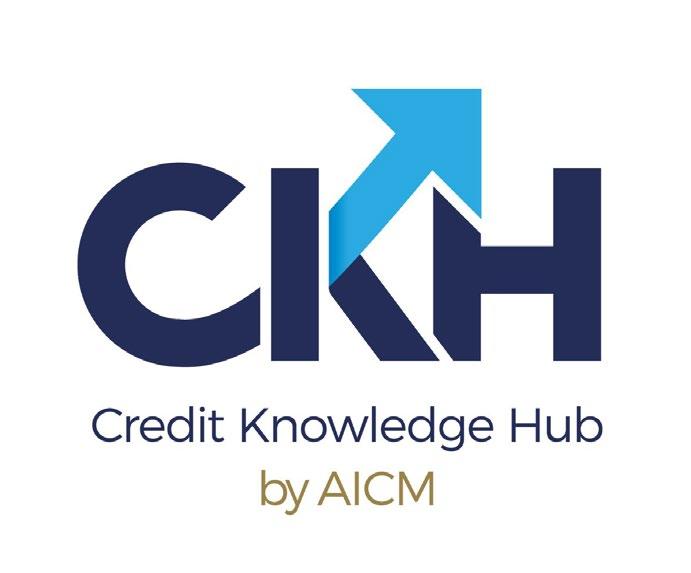
l What the Labor landslide means for the Australian economy
l Exploring the potential of machine learning in credit scoring
l Protecting your supply chain: The power of retention of title




l What the Labor landslide means for the Australian economy
l Exploring the potential of machine learning in credit scoring
l Protecting your supply chain: The power of retention of title

National partners
Divisional partners









Divisional supporting sponsors















• Existing PPSR registrations analysed on sign-up
• Ongoing automated registration & grantor monitoring with alerts
• Customer-level PPSR risk scoring, always up to date
• Bulk file support for registrations & searches
• Integrated ASIC / ABR / NEVDIS data and validation
• Auto-renewals so registrations never lapse or discharge incorrectly
• Ongoing motor vehicle monitoring against NEVDIS & AFSA
• At-a-glance dashboard of all key PPSR metrics
• Modern JSON-based API for seamless system integration
• Dual-jurisdiction coverage – AFSA (AU) & MBIE (NZ)
• Quick one-off searches no account required
• White-label portal & full broker / reseller support
• Hosted on ISO 27001-certified Azure data centres in Australia


Claire Kasses, General Manager
ISSN 2207-6549
DIRECTORS
Julie McNamara FICM CCE – Australian President
Lou Caldararo LICM CCE – Victoria/Tasmania & Australian VP
Troy Mulder FICM CCE – Western Australia/Northern Territory
Rob Jackson MICM CCE – South Australia
Theresa Brown MICM CCE – New South Wales
Steven Staatz MICM CCE – Queensland
Daniel Taylor MICM – Co-opted Director
CHIEF EXECUTIVE OFFICER
Nick Pilavidis FICM CCE
Level 3, Suite 303, 1-9 Chandos Street, St Leonards NSW 2065
PO Box 64, St Leonards NSW 1590
Tel: (02) 8317 5085, Fax: (02) 9906 5686
Email: nick@aicm.com.au
PUBLISHER
Nick Pilavidis FICM CCE | Email: nick@aicm.com.au
CONTRIBUTING EDITORS
NSW – Gary Poslinsky MICM
Qld – Emma Purcival MICM CCE
SA – Clare Venema MICM CCE, Maria Scacchitti MICM
WA/NT – Jeremy Coote MICM CCE
Vic/Tas – Alex Hawtin MICM
Tel Direct: 02 9174 5727 or Mob: 0499 975 303
Email: claire@aicm.com.au
EDITING and PRODUCTION
Anthea Vandertouw | Ferncliff Productions Tel: 0408 290 440 | Email: ferncliff1@bigpond.com
THE EDITOR reserves the right to alter or omit any article or advertisement submitted and requires idemnity from the advertisers and contributors against damages or liabilities that may arise from material published. CREDIT MANAGEMENT IN AUSTRALIA is published by the Australian Institute of Credit Management, Level 3, Suite 303, 1-9 Chandos Street, St Leonards NSW 2065. The views expressed in CREDIT MANAGEMENT IN AUSTRALIA are not necessarily those of Australian Institute of Credit Management, which does not expect or invite any person to act or rely on any statement, opinion or advice contained herein (whether in the form of an advertisement or editorial) and neither the Institute or any of its employees, agents or contributors shall be liable for any opinion contained herein. © The Australian Institute of Credit Management, 2025.
EDITORIAL CONTRIBUTIONS SHOULD BE SENT TO:
Editor, Level 3, Suite 303, 1-9 Chandos Street, St Leonards NSW 2065 or email: aicm@aicm.com.au





Julie McNamara FICM CCE National President
Welcome to the May edition of Credit Management in Australia!
Continual improvement is at the heart of credit management, and in today’s evolving financial landscape, adaptability has never been more important. AICM remains dedicated to equipping you with the knowledge, tools, and resources to thrive.
We are so proud to introduce the Credit Knowledge Hub (CKH), a transformative learning platform designed to elevate professional development with 24/7 access to worldclass training and insights. Together with this magazine, our webinars, and industry events, CKH ensures you have everything needed to grow and succeed.
I also hope, like me, you enjoy the divisional reports in this edition, showcasing the vibrant contributions to our community. A special thanks to our dedicated council representatives – Gary Poslinsky (NSW), Maria Scacchitti MICM, CCE (SA), Emma Purcival MICM, CCE (Qld), Alex Hawtin MICM (Vic/Tas), and Jeremy Coote (WA), whose invaluable reports, interviews, photos, and articles enrich each publication.
How exciting to know all the awards are coming around again for 2025!
Congratulations to our four finalists for the Credit Team of the Year Award 2025 Angle Finance, Auroraenergy, HUON and Interactive. It is an amazing achievement to reach the finals and I wish you all the very best of luck!
We also have the Young Credit Professional and Credit Professional of the year awards coming up. I would encourage all of you to give it a go! Applications close on the 31st of May GOOD LUCK! I can’t wait to celebrate with you all at The Gold Coast Marriott at this year’s Presidents Dinner at National Conference.
A huge thank you to all our contributors for sharing expertise that keeps us informed on economic shifts, technological advancements, and best practices. Your engagement strengthens our industry, and I’m proud to be on this journey with you.
I also look forward to seeing many of you at an AICM event soon. With WINC events selling out and our social and professional events buzzing in every state, it’s clear just how valuable our network and community are in shaping the future of credit management.
Warm regards,
Julie McNamara FICM CCE President, Australian Institute of Credit Management (AICM)


The credit toolbox bundle is a unique opportunity to learn or refresh on the fundamentals of credit management and is taught by credit professionals with extensive experience.
These half-day sessions focus on understanding the core requirements with real application in credit roles.
These programs cover what and why credit professionals do what they do.
Designed for:

New members of credit teams seeking an introduction
Established credit professionals seeking a refresher
Non-credit professionals seeking to better understand credit
Upon finishing all three toolbox bundle programs, attendees will receive a certificate of completion.
Course details:
Dates:
Fundamentals of credit
Thursday 10th July 2025 - 12:30 - 4:30 PM AEST
Collect with confidence
Thursday 17th July 2025 - 12:30 - 4:30 PM AEST
Understanding credit risk
Thursday 24th July 2025 - 12:30 - 4:30 PM AEST
Cost:
Member: $675 inc GST
Non-Member: $855 inc GST
Location:
Online trainer-led group session
CCE: 12 CCE points


The Australian Institute of Credit Management (AICM) is thrilled to launch the Credit Knowledge Hub (CKH), a game-changing education platform designed to redefine professional development for credit professionals. With 24/7 access to world-class training and resources, the CKH sets a new standard for learning in the industry.
Drawing upon AICM’s 50+ years of expertise, the CKH is a comprehensive, subscriptionbased online platform that provides the tools and knowledge necessary to excel in credit management. It is built to support both individuals and teams in acquiring new skills, refreshing knowledge, and adapting to evolving industry demands.
Designed for maximum flexibility, CKH allows members to learn at their own pace, anywhere, anytime. With a vast library of certifications, courses, toolkits, and

masterclasses, the platform covers everything from foundational knowledge to advanced credit practices.
Courses Available on CKH:
l Cert IV in Credit Management
l Diploma of Credit Management
l Cert III in Mercantile Agents
l Toolboxes & Workshops
l Specialised Masterclasses
l And much more!
CKH removes traditional barriers to education, offering unlimited access to premium learning content at an affordable annual subscription. No more waiting for scheduled session, users can dive into over 100 continuously updated resources whenever they need.
✓ 24/7 Access: Learn anytime, anywhere, at your own pace.
✓ Unlimited Training: A single subscription
grants full access to AICM’s education resources.
✓ CCE Qualification Pathway: Advance toward obtaining a Certified Credit Executive (CCE) designation.
✓ Compliance & Best Practices: Ensure your processes align with industry standards.
✓ Trusted Content: Developed by leading experts and backed by nationally recognised qualifications.
Previously, AICM training required purchasing individual modules or attending scheduled sessions. Now, CKH transforms professional development with an affordable, all-in-one subscription model.
For an even greater value, members can bundle CKH with AICM membership, unlocking exclusive benefits, including networking, professional development, and advocacy resources.


With a vast library of certifications, courses, toolkits, and masterclasses, the platform covers everything from foundational knowledge to advanced
Traditional education models can be costly, but CKH significantly reduces expenses:
Learning Method
Self-Paced Online Courses
Trainer-Led Sessions
Qualification Pathways
Cost per Member
$330 – $435 per course
$225 – $775 per session
Previously $3,300+ (Cert IV) and $5,010+ (Diploma)
Now just $1,000 – $1,200 plus subscription
CKH removes traditional barriers to education, offering unlimited access to premium learning content at an affordable annual subscription.
Subscribing is easy, simply complete the purchase form, and within 24 hours, you’ll receive access to CKH and an invoice for your subscription.
For professionals seeking employer support, AICM provides a draft approval request letter to help secure funding for a CKH subscription.
Don’t Wait: Transform Your Credit Education Today!
Unlock unlimited learning opportunities and elevate your career with the CKH, the future of credit education.


AICM would like to congratulate its recent graduates:
FNS51522 Diploma of credit management
A special mention to Ryan Archer who has successfully completed the Diploma of Credit Management as an AICM scholarship recipient.
Ryan Archer QLD Shell Energy Australia
FNS40122 Certificate IV in credit management
Julie Aw VIC VMIA
Deepthika Kannangara QLD Nitto Australia
FNS30420 Certificate III in Mercantile Agents
Rosamil Trinos Philippines
Georgette Little VIC
Citi Bank
CCSG




PROUDLY SPONSORED BY
Congratulations to our top 4 finalists
The National Credit Team of the Year Award (CTOY) is a prestigious recognition of credit teams that excel in their work, results, culture, and commitment to learning.
Since its inception in 2008, the CTOY Award has celebrated the remarkable skills, achievements, and collaborative spirit of Australia’s leading credit teams. Past participants have described the process as one of the most rewarding and fulfilling experiences of their careers, offering a unique opportunity to reflect on their team’s accomplishments.
This year, we received an outstanding array of applications from a diverse range of brands. We extend our heartfelt gratitude to our sponsor Equifax and to our judges, Jarrod Faunt MICM from
Equifax, Rhys Buzza MICM CCE from Reece and Teena Ryan MICM from Woolworths. Their expertise and dedication have been instrumental in selecting the finalists.
We are thrilled to announce the four finalists for the 2025 Credit Team of the Year Award, each of whom has demonstrated exceptional achievements in credit management, cultural transformation, and innovation.
Each finalist has showcased excellence in credit management, process improvement, and workplace culture, making them strong contenders for the 2025 Credit Team of the Year Award.
Thank you to Equifax for supporting this award, and this amazing opportunity to celebrate the achievements of Australia’s leading credit teams.



Angle Finance’s credit team reduced broker call abandonment rates significantly and improved lender-of-choice ratings with innovations like Green ID verification and same-day settlements. They optimised AML processes, enhanced security, and fostered leadership and learning, achieving high scores in innovation and company confidence.
Aurora Energy restructured its credit team, dramatically increasing engagement and reducing occupier debt by half, with a goal to lower it further. They improved customer communication, cut bad debt write-offs substantially, and cleared COVID-era debt for vulnerable customers. Training programs and cultural rejuvenation were key drivers of their success.

Huon Aquaculture excels in values-driven operations, achieving minimal overdue debt, substantial rebate savings, and a flawless bad debt record. Their use of AI technology has streamlined processes and earned awards for efficiency. Employee growth is supported through development plans, webinars, and leadership programs.
Interactive leveraged technology to manage overdue balances effectively, reducing DSO and cutting overdue amounts significantly. They foster collaboration and recognition, implemented semi-automation for efficiency, and invested in training to empower team growth and decision-making.
By Carrie Cheung*

The Equifax Q1 2025 Consumer Credit Report reveals growth in credit demand alongside emerging financial pressures. Unsecured credit demand, encompassing credit cards, personal loans, and BNPL, registered a second consecutive quarterly increase, up 5.5% year-onyear.
Buy Now Pay Later growth led at 17.8%, followed by a 5.7% increase in credit demand for
personal loans and a marginal 0.4% rise in credit cards.
Secured credit, encompassing mortgages and auto loans, also expanded by 4.3% in Q1 2025 year-on-year. A surge in mortgage demand was the primary driver, while auto loans saw a modest 0.3% increase.
The robust credit appetite of this year’s first quarter is contrasted by escalating arrears and financial hardship, notably within larger mortgage
Consumer Credit Demand Index Indexed to Q4 2019

Source: Equifax Australia
NB: This data has been re-indexed from 2019 to account for the recent inclusion of BNPL applications: Re-indexed data to commence in 2019 (previously 2015). Added BNPL and auto loan credit enquiries as a separate trendline (previously rolled up into personal loans)
Opened and closed accounts % of portfolio
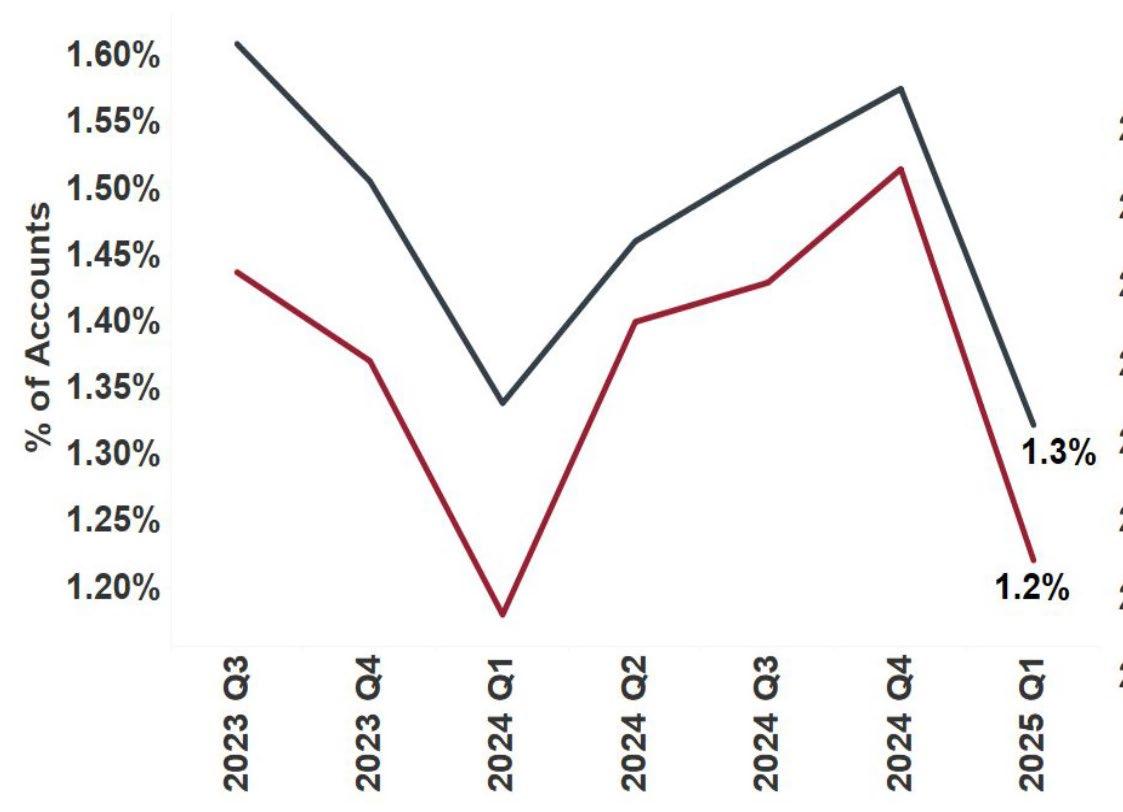

portfolios and among consumers navigating post-holiday debt.
Key themes explored below:
Refinancing activity fuels mortgage market rebound
Mortgage demand saw a significant uplift in Q1 2025, increasing by 5.2% compared to Q1 2024. This was primarily driven by a substantial rise in external refinancing – consumers switching lenders – which grew by 11% year-on-year, marking the first positive Q1 result since 2023.
External refinancing exceeded 20% in March 2025, as consumers actively sought more competitive rates in response to market shifts. The interest rate hikes initiated in 2022 triggered a similar pattern, and this proactive consumer behaviour is evident again in anticipation of potential rate cuts.
Given mortgage approval timelines, this trend is likely in its early stages. Ongoing global tariff uncertainty and their potential impact on interest rates suggest consumers will
New accounts opened Average limit per account
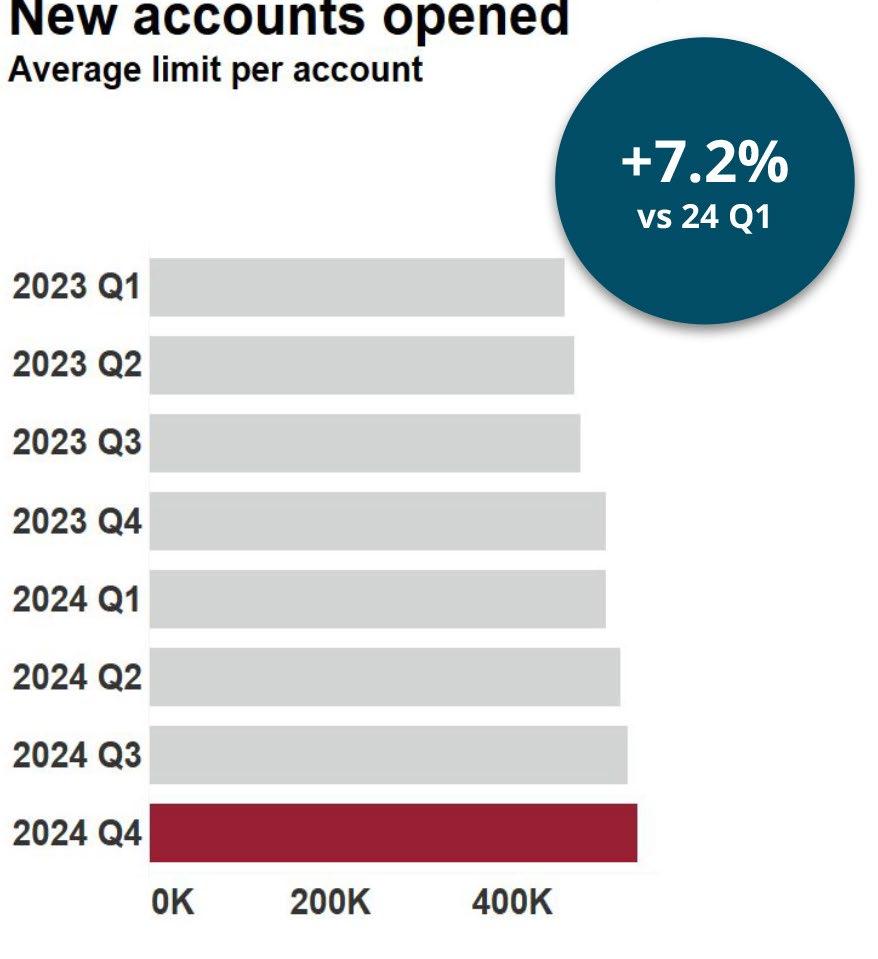

continue to actively manage their mortgage positions.
Investors dominate mortgage refinancing
Investor activity dominated the refinance market, representing up to 80% of total inquiries in March 2025, compared to approximately 60% in March 2024. This demonstrates investors are over twice as likely to refinance compared to owneroccupiers, likely capitalising on
favourable economic conditions and anticipating further rate reductions.
Examining refinance trends in Q1 2025 reveals that over 30% stemmed from mortgages originated during the low interest rate period of 2020-2021. A notable share of this activity also involves borrowers who had previously refinanced, largely in 2022-2023, when refinance volumes peaked amidst rising rates and available offers.
Mortgage holders with large loans exhibit increasing repayment strain
While overall mortgage demand has increased, a significant rise in the dollar value of mortgages over 90 days past due signals growing repayment challenges among borrowers with larger loan amounts.
Mortgage debt has expanded due to sustained higher mortgage borrowings driven by property valuations. Larger mortgages, exceeding $1 million, are displaying unprecedented repayment stress, with arrears rates surpassing all other loan size segments for the first time on record.
In fact, arrears on larger loans have grown four times faster than other loan sizes over the past two years. This upward trend in delinquency spans all age groups, with the 31-45 year cohort showing the fastest growth.
Despite a stable number of accounts in 90+ day mortgage arrears, total limits in arrears have increased to 9.2% in Q1 2025 compared to the same period last year. This divergence highlights that financially stressed borrowers are accumulating larger debt burdens, with limits owed per account in arrears rising persistently amid deteriorating housing affordability post the pandemic property boom.
In another sign of consumer strain, amortised limits rose in Q1 2025, up 5% year-over-year to a five-year high. Victoria’s growth trailed other states, with a growth rate of 3.7% compared to Queensland’s strong 7.8% and 4.5% in NSW.
Delinquency rate by loan size

Source: Equifax Australia
$1M+ home loans delinquency rate by age
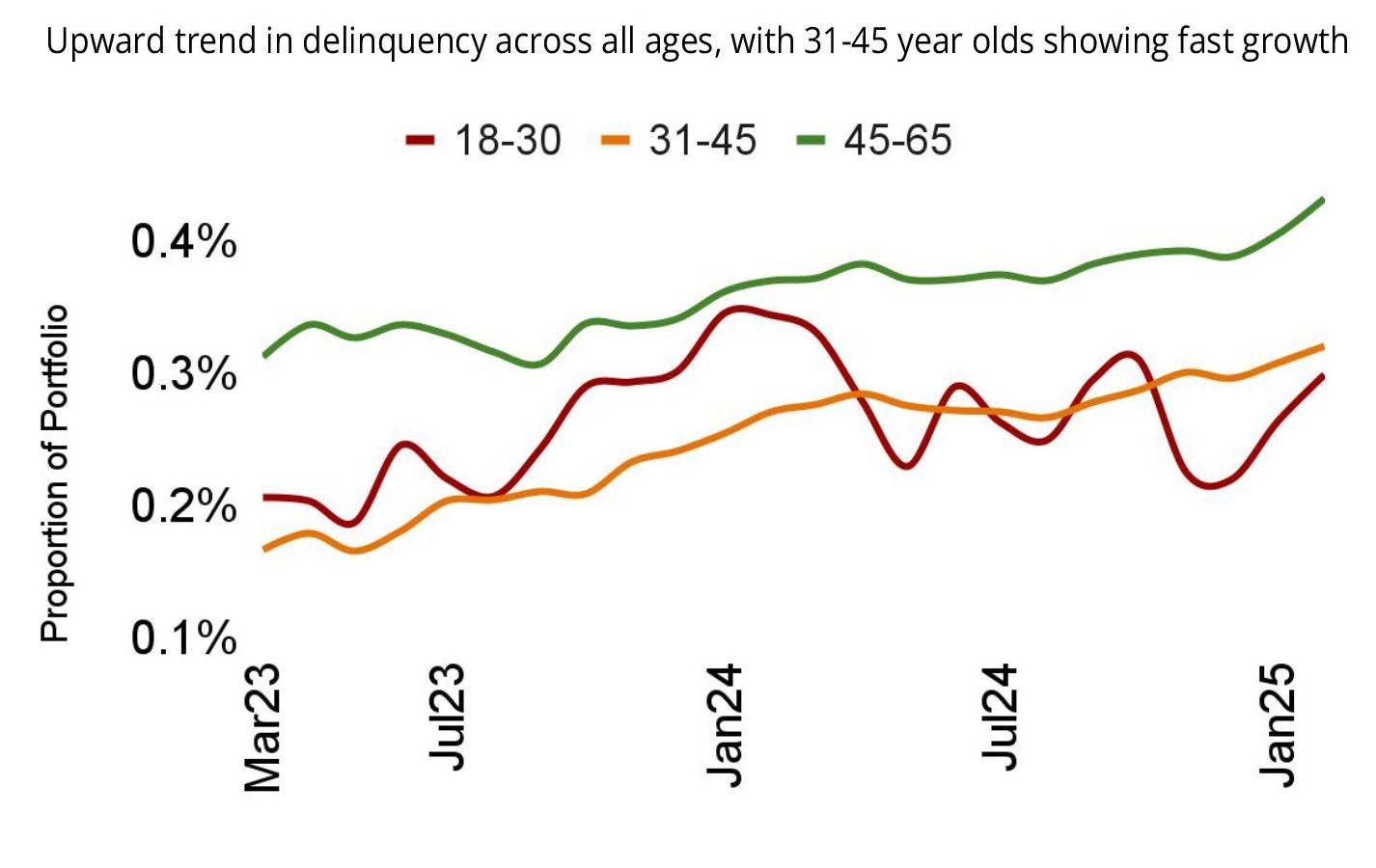
This escalating debt burden necessitates granular risk assessment, emphasising close monitoring of highvalue mortgages for financial stress and proactive provision of support options to mitigate potential losses.
The financial aftermath of the holiday season is evident in the Q1 2025 data. Credit card arrears saw a significant
Source: Equifax Australia
year-on-year surge of 19.3%, indicating holiday-related debt is impacting consumers, with both early and late-stage delinquencies on the rise. The average limit for accounts over 90 days past due reached $7,100 in Q1 2025, up from $6,900 at the same time last year.
The total amount owing across all credit products has increased. While the proportion of personal loan accounts in arrears improved, this is attributed to nominal
account growth due to portfolio expansion. However, the total limits in personal loan arrears has also grown, up 18.7% in Q1 2025 compared to the same period the previous year, with the average delinquent loan at $12k, a 10% year-on-year increase.
Auto loan arrears growth, at 7.1% in Q1 2025, saw a slight deterioration from the previous quarter and remained stable year-on-year.
Crucially, the dollar amount owed by consumers in arrears has increased significantly across all product types, highlighting a broad trend of potential overspending during the holiday period. Credit cards and auto loans recorded the largest increases in accounts reported as experiencing financial hardship, at 5.8% and 5.1%, respectively.
As Australia’s leading consumer and commercial credit bureau, Equifax provides credit professionals with a comprehensive and consistent view of potential risk through its extensive data sources, credit reports, and alerts. Equifax’s unique ability to integrate individual and business financial data within a single credit report, leveraging AI-driven scoring models and advanced matching capabilities, enhances risk assessment and decision-making processes.
*Carrie Cheung Head of Insights
Equifax Contact the Equifax team to find out more on 13 8332 or equifax.com.au/contact.
Credit card delinquency rate
Accounts in arrears as % of portfolio


Personal loan delinquency rate
Accounts in arrears as % of portfolio
Source: Equifax Australia


Auto loan delinquency rate
Accounts in arrears as % of portfolio
Source: Equifax Australia


Source: Equifax Australia
By Monika Lacey MICM*
Uncertainty remains the name of the game for Kiwi households and businesses alike. The global economic climate coupled with the ongoing cost of living crisis is making it difficult for people to feel a sense of stability.
Recently, the Reserve Bank of New Zealand reduced the Official Cash Rate (OCR) to 3.5%, reaching the lowest it’s been since October 2022.

In response to the OCR cuts, we saw many of the major banks cut interest rates to reflect this shift in monetary policy, in some cases making it easier for people to borrow and lock in lower interest rates for their mortgages.
But the thinking behind this decision has been a point of discussion for economists,
and opinions vary about what the right course of action for the Reserve Bank should be to navigate these challenging times.
Personal loan arrears have reached double digits for the first time since February 2024, yet there’s a silver lining – yearon-year declines in vehicle, credit card, and Buy Now Pay Later arrears.
Encouragingly, financial hardship figures continue to ease after a steady climb since November 2022.
Household financial strain remains most pronounced in mortgage repayments, followed by credit card debt and personal loan obligations.
This trend suggests that, despite ongoing economic uncertainty, many individuals are
“The global economic climate coupled with the ongoing cost of living crisis is making it difficult for people to feel a sense of stability.”


taking proactive steps to manage financial challenges by working with lenders.
Meanwhile, Kiwi businesses persist in showing resilience despite persistent pressures.
Company liquidations have surged by 35% over the past
year, with transportation and construction firms particularly vulnerable to financial strain.
The manufacturing sector is also feeling the impact, grappling with reduced demand and uncertainty in global trade policies.
Looking at recent arrear trends, we saw the number of consumers in arrears in March 2025 climb to 489,000 – an increase of 9,000 from the previous month – accounting


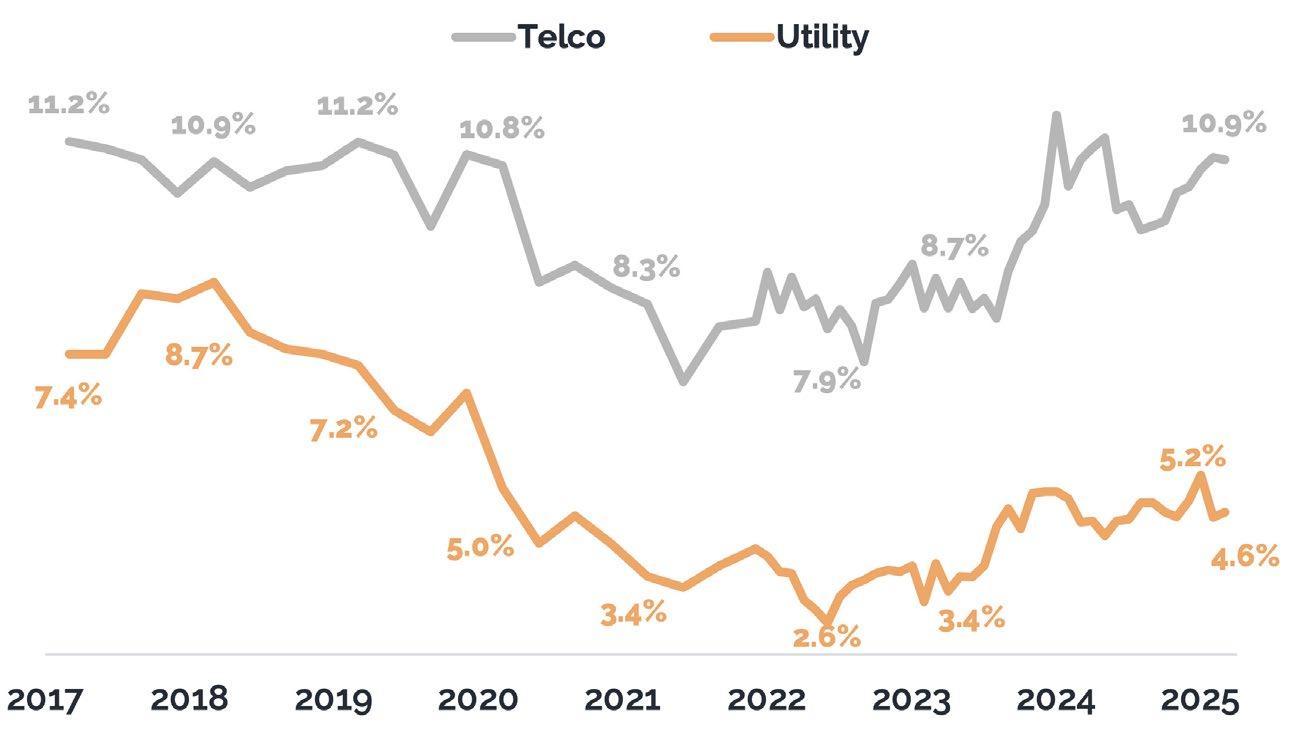
for 12.61% of the credit-active population.
This uptick follows the typical seasonal trend, as household finances often experience strain after summer.
Despite the month-on-month rise, the current arrears rate remains 0.7% lower than the same period last year, hinting at potential recovery in the credit cycle. Of those in arrears, 174,000 consumers are over 30 days past due, with 74,000 exceeding 90 days.
Furthermore, March saw personal loan arrears surpass 10% for the first time since February of the previous year, reflecting a notable 4% year-on-year increase.
Meanwhile, vehicle loan arrears edged up slightly to 5.8% from 5.7% in February but remained below last year’s figures. Credit card arrears also saw a minor increase to 4.7%, though they were 3% lower compared to the same time last year.
Buy Now, Pay Later (BNPL) arrears continued their downward trend, falling to 8.4% in March – a 7% year-on-year decrease.
Retail energy arrears ticked up to 4.6%, marking a 4% annual increase, while telco arrears for mobile and broadband services remained steady at 10.9%, consistent with the previous year.
Over this period, home loan arrears surpassed seasonal expectations, with 24,000 residential mortgage accounts reported as past due – an increase of 700 from the previous month and a 7% rise compared to the same period last year.
The arrears rate edged up
to 1.58%, slightly higher than February’s 1.55%. However, loans overdue by more than 90 days have remained stable, indicating some consistency in longer-term delinquencies.
Approved lending and credit demand continues to climb
Consumer credit demand experienced moderate growth, rising 2.4% year-on-year. Credit card applications remained a strong driver of this increase, surging by 23.8%. However, auto loan demand saw a slight decline of 4%, while Buy Now Pay Later (BNPL) transactions dropped 6.5%.
The property market showed heightened activity, with mortgage applications jumping 17.8% as borrowers sought

“Consumer credit demand experienced moderate growth, rising 2.4% year-onyear. Credit card applications remained a strong driver of this increase, surging by 23.8%.”
Credit Demand by Product Type
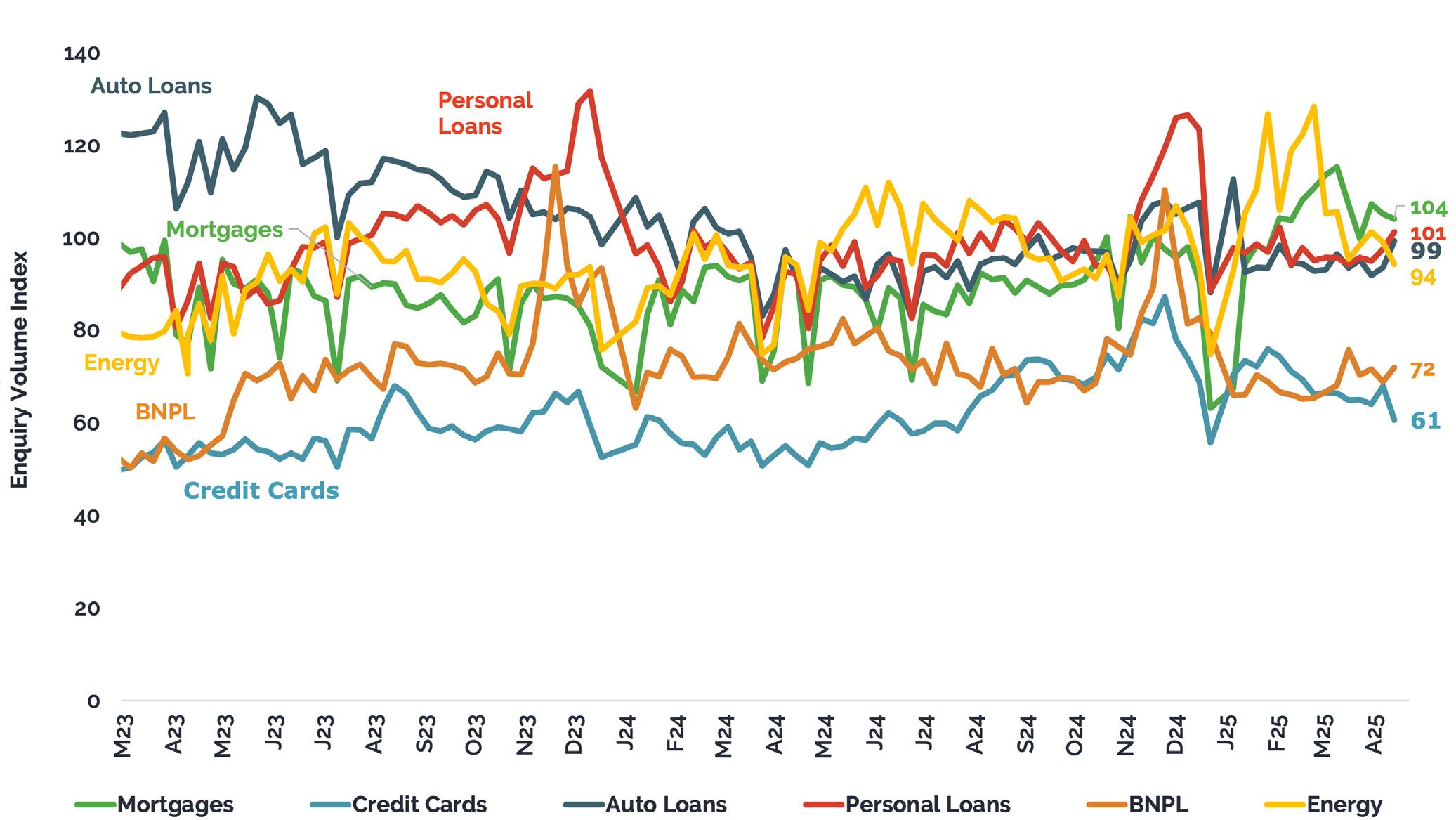
more competitive interest rates. New mortgage lending reflected this trend, climbing 23.3% compared to the previous year. Despite this growth, volumes remain 18% below the peak reached during the 2021 property boom.
Non-mortgage lending – including credit cards,

vehicle loans, personal loans, BNPL, and overdrafts – rose 7.1% year-on-year, with vehicle loans playing a key role in this increase. In total, new household lending expanded by 21.7%, indicating increased borrowing across multiple financial products.
One interesting trend is around the rate of financial hardships recorded in March 2025.
There were 14,400 accounts reported in financial hardship in March, a decline of 200 from the previous month but remain up 11.5% year-on-year.
Although financial hardship cases have been rising since November 2022, this has shown a slowdown in recent months.
“The property market showed heightened activity, with mortgage applications jumping 17.8% as borrowers sought more competitive interest rates.”


Financial

Mortgage payment difficulties account for 45% of these cases, followed by credit card debt at 30% and personal loan repayments at 17%. The highest rate of financial hardships is observed among individuals aged 35 to 49.
High company liquidation figures highlight economic squeeze
New Zealand businesses continue to grapple with economic uncertainty, facing persistent financial pressures. Business credit demand has
risen 9% year-on-year, with the arts and recreation services sector seeing the strongest growth at 23%, followed by property (21%) and financial/ insurance services (20%).
However, rising credit demand has coincided with
Business Credit Demand: 2020 – 2025

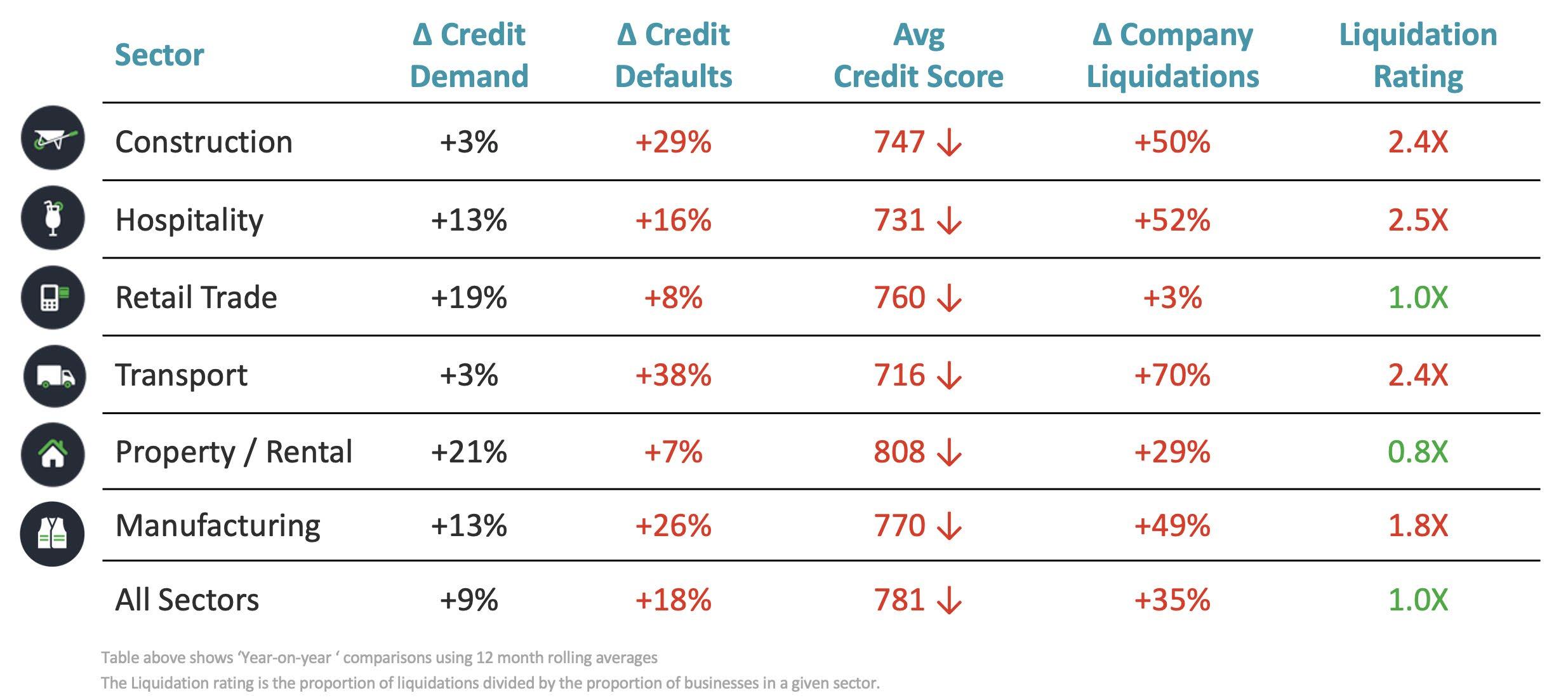
“Company liquidations have surged by 35% over the past year. Construction firms, in particular, remain heavily impacted, with more than 720 building companies entering liquidation in the last 12 months.”
increased defaults across all sectors. Transport recorded the highest jump at 38%, followed by construction (29%) and manufacturing (26%), underscoring the ongoing financial strain affecting these industries.
Company liquidations have surged by 35% over the past year. Construction firms, in particular, remain heavily impacted, with more than 720 building companies entering liquidation in the last 12 months.
Insolvency figures for March 2025 showed a slight decline,
totalling 268, compared to 284 in March 2024.
However, company liquidations rose to 257 – up from 239 in the same period last year. Among the hardesthit businesses are residential new home builders, cafés and takeaway food outlets, and property developers, which have recorded the highest number of company failures.
It’s clear 2025 isn’t proving to be the return to fiscal abundance
many had hoped for. The lagging economic recovery coupled with the ongoing global uncertainty is causing caution across the board.
With the New Zealand Government’s annual budget coming up this month, all eyes will be on the Finance Minister to see where fiscal tightening will occur to deliver a surplus to New Zealand’s economy.
*Monika Lacey MICM Chief Operating Officer Centrix Credit Bureau of New Zealand www.centrix.co.nz
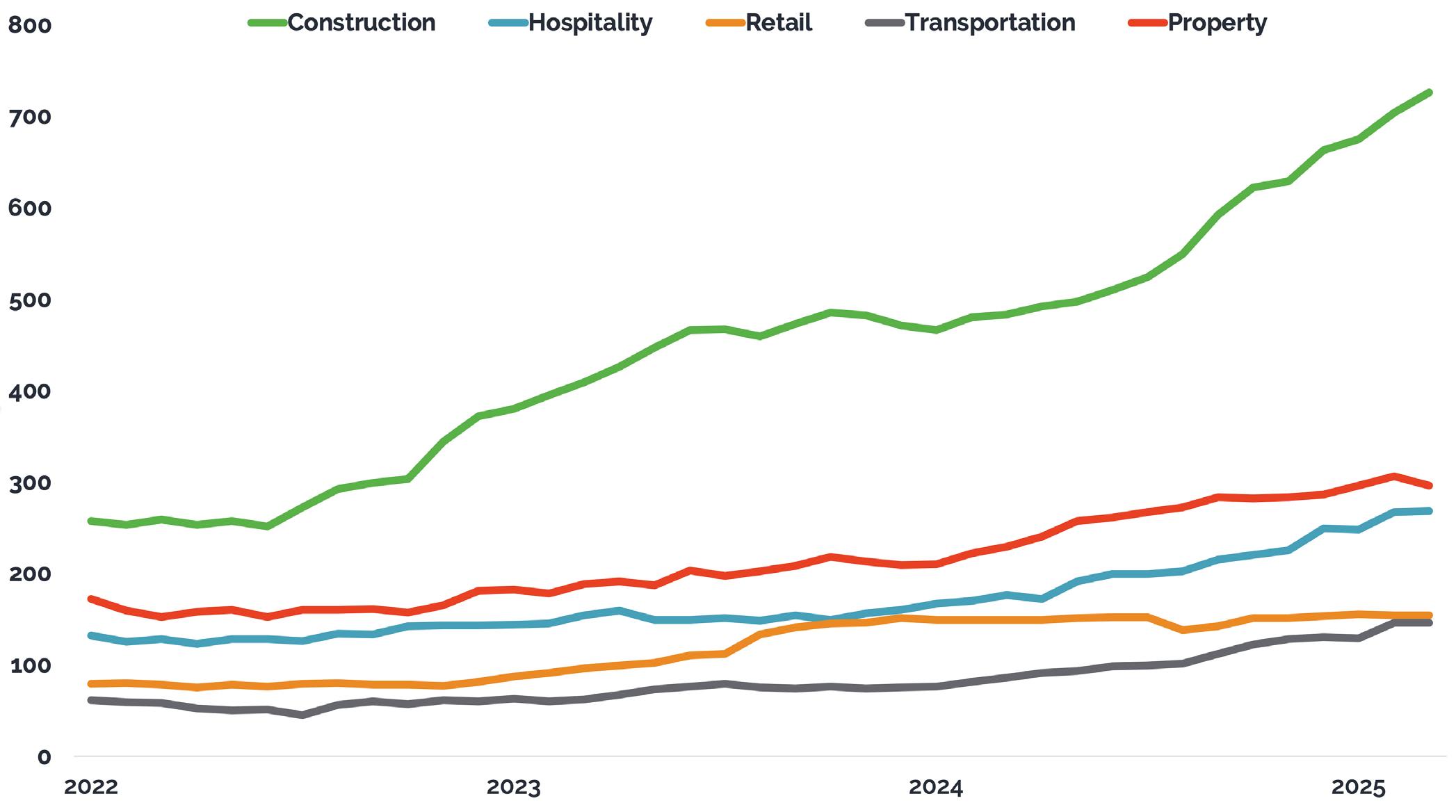
By Ivan Colhoun*

While the opinion polls were generally indicating a win for the incumbent Labor government, the result was a landslide win that no pollster predicted. Adding salt to the wounds, the Leader of the Opposition, Mr Dutton, became the first Leader of the Opposition in history to lose his seat, meaning the Coalition must now elect a new leader. Such was the scale of the rout, that a number of other senior Liberal shadow ministers also lost their seats.
At the current time, the ALP has 90 seats, well above that required for a majority, with a real possibility it may end up with several more. The scale of the ALP win sees the Liberal Party dramatically reduced as a Coalition partner, with very few
seats in inner-city Melbourne, Sydney, Adelaide and Hobart. “Teal” Independents generally improved their positions in the wealthier inner city electorates previously the domain of traditional Liberal voters.
The main reasons advanced for the disastrous result for the Opposition included:
l A lack of real policy options, with only the divisive and not well understood nuclear energy policy completely different from the government
l A very poor election campaign that saw considerable policy mis-steps including promising to reverse a small income tax cut introduced by the government in the budget, a promise to force public servants back to full-time
“The scale of the ALP win sees the Liberal Party dramatically reduced as a Coalition partner, with very few seats in inner-city Melbourne, Sydney, Adelaide and Hobart.”

“The Labor Party did better in terms of providing support for those impacted by the cost of living, the key issue for most voters.”
work in the office, 41,000 public service jobs to be cut, expressing the view that the welcome to country should be less frequent. Some of these missteps and/or policies allowed comparison to Mr Trump
l The Trump tariff shock likely caused voters to stick with the safety of a known entity. Indeed, the strength of the swing against the Liberals right across the country, suggests a common factor such as Trump, though this paragraph suggests the Liberals made many mistakes.
l Unpopularity of the
Opposition Leader, Mr Dutton, though until very recently he was preferred PM in polls.
l The Labor Party did better in terms of providing support for those impacted by the cost of living, the key issue for most voters. While the Opposition did provide cost of living options, this was a relatively new conversion as they had continually argued against previous Labor cost of living support.
l It’s also possible that the voting population decided that a majority government was a better outcome than a minority government.
Strategists note that the Coalition’s main constituency is older, white voters (the Baby Boomers – which are a declining proportion of the population).
The Australian Financial Review’s Andrew Tillett, noted that Labor targeted renters, mortgagees, younger voters, those with a university education, middle income voters and those with a migrant background. Many of the seats picked up from the Liberal or Greens had either higher than average numbers of voters with mortgages or renting, especially the five big surprises (two Green seats in Brisbane and the seats of Dickson, Hughes and Moore.
So what does all this mean for the economy?
The key economic and societal challenges facing the re-elected government are not impacted by the election result. First, the government will have to negotiate/deal with President Trump’s trade and tariff policies. Other challenges include the megatrends I have written about before: AI/technology; the ageing population; geopolitics; climate change and rising inequality. The election results suggest the ALP is perceived as better placed to manage these pressures – or perhaps more correctly to look after those affected by these trends.
Treasurer Chalmers confirmed the Government did not have a mandate for broader tax reform as this was not taken to the people at the election. That’s a shame as Australia desperately needs tax reform – lower income taxes and higher indirect taxes (GST), though neither side of politics seems brave enough to address this issue.
Beginning to address budget repair would be worthwhile, though measures to redress inequality work in the other direction given the failure to address tax reform. A good first step would be to reintroduce a cap on spending as a percent of GDP.
The Treasurer highlighted a focus on improving productivity.
“The key economic and societal challenges facing the re-elected government are not impacted by the election result.”

My investigations suggest that the best approach in this regard would be to address productivity on a sector by sector basis rather than in aggregate. Aggregate productivity will be restrained by the ageing population, and the increase in jobs in lower productivity areas such as health and aged care. Focus should be on improving productivity in these large, low productivity areas, while also addressing the drop in productivity in other large sectors such as Finance, Construction, Education and Training and Mining. Regulation is likely to be a big factor in each of the latter sectors.
The election result is unlikely to affect the RBA’s deliberations on May 19/20. The continued progress in reducing inflation towards target justifies a further reduction in the degree of restriction imposed by current interest rate settings, while the ongoing low unemployment rate argues against the need for a large cut, in spite of global uncertainties, which may quickly be reversed or lessened.
*Ivan Colhoun Chief Economist CreditorWatch
E: ivan.colhoun@creditorwatch.com.au www.creditorwatch.com.au
“... Australia desperately needs tax reform – lower income taxes and higher indirect taxes (GST), though neither side of politics seems brave enough to address this issue.”

Corporate Insolvency: 10 June 2025 – Share scenarios, discuss legislative proposals, and drivers of insolvency trends. Register Now
eInvoicing: 17 June 2025 – Dive into the latest in electronic invoicing through the Peppol Framework. Register Now
Personal Insolvency: 8 July 2025 – Explore trends, scenarios, and legislative changes. Register Now Complaints and Disputes: 15 July 2025 – Share best practice insights, legislative updates, and industry trends. Register Now
Personal and Team Development: 12 August 2025 – Focus on recent trends challenges and achievements. Register Now
l Share and Learn: Exchange insights on what strategies work and what don’t, gaining valuable knowledge from peers.
l Answer Known and Unknown Questions: Find answers to your questions and discover new ones through engaging discussions.
l Deep Dive into Practical Aspects: Explore the practical, day-to-day aspects of our work in greater detail.
l Explore Complex Issues: Understand how others approach areas where there are no clear blackand-white answers so you can implement the best solution for your scenario.
l Tap Community Knowledge: Access the collective wisdom of the community and understand the credit profession’s day-to-day realities.
l Understand Best Practices: Learn and implement industry best practices shared by fellow professionals.
l Professional Growth: Gain new ideas for improvement and stay ahead of trends.
l Contribute to Advocacy: Play a role in AICM advocacy efforts and shape the future of our profession.
l Membership Benefits: Enhance your membership experience and build valuable professional relationships.
We are excited to announce the launch of our new member only Special Interest Groups (SIGs), designed to enhance your professional development and foster stronger connections within our community. These groups will offer a unique platform to dive deep into niche topics, share best practices, and discuss the day-to-day challenges and triumphs of our profession.
Customer Engagement and Support: 19 August 2025 –Discuss recent trends, hardship, vulnerability, and resolving payment disputes. Register Now
Corporate Insolvency: 9 September 2025 – Share scenarios, discuss legislative proposals, and drivers of insolvency trends. Register Now
eInvoicing: 16 September 2025 – Dive into the latest in electronic invoicing through the Peppol Framework. Register Now
Personal Insolvency: 11 November 2025 – Explore trends, scenarios, and legislative changes. Register Now
Click here and login to see more dates for 2025
l Quarterly Zoom Meetings: Join interactive sessions with audio and video.
l Pre-Meeting Surveys: Share your initial views, questions and comments before the meeting to help shape the discussion.
l Facilitated Discussions: Engage in open forums led by experienced chairs.
l Ongoing Engagement: Continue the conversation post-meeting via the AICM LinkedIn Group.
l There will be at least two SIGs each month, with each session lasting one hour.
l Topics will initially be held quarterly which may increase or decrease based on developments in the area.
l Registration is open now for the upcoming sessions.
l SIGs are a member only benefit.
We look forward to your active participation in these groups. Together, let’s shape the future of our profession and strengthen our community.

In 2025, Good360 Australia proudly celebrates 10 years of creating real impact-delivering over 43 million new items to over 4 million people doing it tough across the country. This milestone is made even more meaningful through our partnership with the Australian Institute of Credit Management (AICM), as we also mark the 10-year anniversary of the Women in Credit (WINC) initiative.
We’re inviting AICM members to join us
in celebrating this shared milestone at the upcoming WINC luncheons across the country, where Good360 Founder and MD, Alison Covington AM will share her inspiring journey of turning corporate experience into national impact.
Fighting Material Deprivation: More Than Just Missing Items
Material deprivation isn’t just about lacking

“Our mission is simple but powerful: ensure that no usable new product goes to waste when it could support someone in crisis.”

furniture, clothing, or whitegoods – it’s about missing the chance for stability, dignity, and wellbeing. It means families sleeping without bedding, children attending school in ill-fitting uniforms, or adults unable to cook meals due to broken or missing appliances.
In Good360’s newest report, we explore the continued impacts the cost-of-living crisis is

Alison Covington AM, Good360 Australia Founder & MD.
having on everyday Australians and their ability to afford basic home essentials. The facts:
l 9.1 million Australians say the cost-of-living crisis is worse for them than it was a year ago.
l 17% have delayed replacing broken or worn-out household items due to financial strain.
l 2.9 million Australians can’t afford the basic essentials to live comfortably at home.
Read Good360’s full report on material deprivation

How Good360 Makes a Difference
Good360 Australia is a not-for-profit that connects businesses with surplus new goods – everything from bedding and toiletries to toys and technology – and redistributes them to people in need via a network of over 4,700 charities and disadvantaged schools Australia-wide.
Our mission is simple but powerful: ensure that no usable new product goes to waste when it could support someone in crisis. By working in four key impact areas – Education, Home, Hygiene, and Play – we restore dignity and comfort to people around Australia.
In a country where $2.5 billion in household goods go to waste each year, and 1 in 8 Australians live in poverty, Good360’s model is both practical and transformative.

Join Us at the WINC Luncheons
At the luncheons, Alison Covington AM will share how she built Good360 from the ground up and why product philanthropy is changing lives across Australia. Her message is one of innovation, action, and hope – perfectly aligned with AICM’s mission to empower and uplift.
Be Part of the Circle of Good
You can help extend Good360’s impact in three powerful ways:
1. Attend a WINC luncheon near you and hear firsthand how your support makes a difference. Register today
2. Make a donation – every $1 enables Good360 to deliver $20 worth of goods to people in need. Donate here
3. Spread the word within your networks and help grow the Good360 Circle of Good. Perhaps
you have a client who has surplus goods they can donate to help their local community. Learn more here
Together, we can help fill homes not just with goods, but with dignity, stability, and care.
Learn more at the Good360 Australia website
Because everyone deserves more than four walls – they deserve a home filled with comfort and hope.




By Andrew Spring MICM CCE and Nash Chance*
In uncertain times, even longstanding customer relationships can end in financial loss. But there is a way for suppliers to reduce risk. A well-structured Retention of Title clause can mean the difference between recovering goods or writing off the debt entirely.
When a customer enters formal insolvency, suppliers often find themselves out of pocket, waiting in line as unsecured creditors – hoping (often in vain) for a dividend. But one powerful protection that credit managers can leverage is the Retention of Title (RoT) clause. A well-drafted and properly implemented RoT clause can make the difference between recovering your goods or writing off a bad debt. In essence, an RoT clause ensures that legal ownership of goods remains
with the supplier until payment is made in full. It’s a strategy that shifts the supplier’s position from unsecured creditor to secured party – a that is, if the right steps are followed.
In an insolvency scenario, unsecured creditors are usually left with little or nothing once priority creditors are paid. However, suppliers with a valid and enforceable RoT clause may be entitled to recover their goods
“A well-drafted and properly implemented RoT clause can make the difference between recovering your goods or writing off a bad debt.”

“The RoT clause must be explicitly included in the trade supply agreement and on any invoices issued under that agreement. This creates clear contractual grounds for reclaiming the goods in the event of default.”
before they’re sold or otherwise dealt with by the administrator or liquidator.
Take, for example, a recent case involving a national stationary supplier. Thanks to an RoT clause that was not only correctly drafted but also properly registered on the Personal Property Securities Register (PPSR), the supplier was able to recover more than $20,000 worth of inventory. Without the protection of RoT, they would have participated as an unsecured creditor in a liquidation where no dividend was paid, resulting in a total write-off of the debt.
This outcome is not uncommon. For credit managers, it highlights how proactive risk management and a strong understanding of RoT provisions can safeguard a business’s bottom line.
The essentials of an effective RoT arrangement
Despite its potential, an RoT clause is only as strong as its implementation. Credit managers should ensure that the following three key elements are in place:
1. Contractual clarity
The RoT clause must be explicitly included in the
trade supply agreement and on any invoices issued under that agreement. This creates clear contractual grounds for reclaiming the goods in the event of default.
2. Timely PPSR registration
Suppliers must register their security interest on the PPSR immediately after the goods are supplied or a contract is entered into. A failure to do so risks the interest being ‘unperfected’, meaning the goods will likely vest in the insolvent company under Section 267 of the Personal Property Securities Act 2009
3. Clear identification of goods
Goods must be marked in a way that links them directly to the relevant invoice. While serial numbers are ideal, they aren’t always practical –particularly for high-volume inventory. In those cases, some other clear, traceable identifier must be used.
Common pitfalls – and costly consequences
Unfortunately, credit managers frequently encounter issues that undermine their RoT rights. These include:
1. Late or no PPSR registration
Waiting until a customer is clearly in trouble to register an interest can backfire. Under Section 588FL of the Corporations Act 2001, a security interest granted within six months of administration or liquidation must be registered within 20 business days. Otherwise, it’s voidable.
2. Unidentifiable goods
A national paper supplier recently lost out on a $4,000 recovery because the goods couldn’t be matched to the invoices that were subject to the RoT clause. Similarly, a local mechanic lost over $45,000 in equipment installations because the registration didn’t comply with the Corporations Act timeline.
3. Assuming best intentions are enough
Goodwill and verbal assurances offer no protection in insolvency. Without proper documentation and registration, suppliers have no enforceable rights.
In another example, a local plumber lost the opportunity to reclaim over $8,000 in water pumps installed on a rural property – simply because the interest wasn’t registered. These cases underline the importance of having robust systems in place and being proactive, not reactive.
Under Australia’s Small Business Restructuring (SBR) process, secured creditors (including those with RoT claims) typically don’t have to compromise on their debt, provided their interest is valid and enforceable. Since goods subject to RoT are often used in the day-to-day running of a business, credit managers with compliant RoT clauses can often avoid participating in the compromise altogether.
Protect now, recover later Insolvency scenarios can be complex and unpredictable, but an effective RoT strategy is one of the best tools at a credit manager’s disposal. By ensuring contractual clarity, timely registration, and identifiable goods, suppliers can improve their chances of recovery –and avoid being caught in the unsecured creditor queue. It’s a small investment in time and due diligence, but one that can pay substantial dividends when things go wrong.
*Andrew Spring MICM CCE Partner Jirsch Sutherland
*Nash Chance Manager Jirsch Sutherland www.jirschsutherland.com.au

“By ensuring contractual clarity, timely registration, and identifiable goods, suppliers can improve their chances of recovery – and avoid being caught in the unsecured creditor queue.”

By Sam Rodda*

Tariff volatility is a constant reality and it’s not going away anytime soon. Tariffs can change rapidly and without warning, creating ongoing uncertainty for trade creditors. The introduction, adjustment, or removal of tariffs can have a profound and immediate effect on supply chains, margins, and customers’ financial stability. For credit professionals, staying ahead of tariff-related risk isn’t just a best practice – it’s business critical.
While tariffs are typically government-imposed taxes on imported goods, their implications extend far beyond the border. From delayed shipments and cost hikes to buyer insolvency and payment defaults, tariff shocks can pressure a trade creditor’s exposure.
So, how can credit professionals navigate this landscape and protect their organisations?
According to ASIC, insolvencies surged by 43% in the first quarter of the 2024–25 financial year compared to the previous year. Construction, retail, and food sectors have been especially hard hit, driven by rising costs, tightening credit conditions, and ongoing global uncertainty. In this landscape, even reliable customers can become sudden risks – making proactive credit risk management more important than ever.
What short-term risk management actions can you take?
1. Assess exposure in the supply chain
Before you can manage the risk, you need to understand it. For
“The introduction, adjustment, or removal of tariffs can have a profound and immediate effect on supply chains, margins, and customers’ financial stability.”

“Before you can manage the risk, you need to understand it. For trade creditors and executives managing global supply chains this means identifying customers whose operations depend on tariff-sensitive goods or services.”
trade creditors and executives managing global supply chains this means identifying customers whose operations depend on tariff-sensitive goods or services. The following questions are a starting point to help you assess potential disruptions due to tariffs: Are they importing raw materials or finished goods recently becoming more expensive? Are their end customers scaling back due to tariff-related price increases? These upstream and downstream considerations must be embedded into your credit assessment process. Ask the hard questions: Which
of our customers operate in tariff-vulnerable sectors? How dependent are they on specific regions or trade relationships? What contingency plans do they have in place?
2. Understand how tariffs can impact payment risk
Tariff volatility does not impact profitability, but it destabilises cash flow and increases the likelihood of delayed payments or defaults. Creditors need to anticipate how rising input costs, reduced customer demand, or disrupted supply chains could impair their buyers’ ability to meet payment terms.
This is where trade credit insurance can play a crucial role. A well-structured policy can help mitigate non-payment risk from economic hardship, geopolitical instability, or other tariff-driven disruptions. Regular policy reviews are essential to ensure you’re covered for emerging risks and industry-specific exposures. Beyond traditional protection, modern policies now serve as strategic tools. Insurers actively monitor customer creditworthiness, provide early warning signals, and support debt recovery. This transforms trade credit insurance into a dynamic enabler of secure growth.
Scenario modelling is a useful but underused tool in credit management. Building tariffbased scenarios into your credit risk analysis allows you to anticipate what might happen if tariffs were imposed (or lifted) on specific goods.
For example, If steel or aluminium tariffs were introduced on a key customer’s input materials, how would that affect their margins? Could they absorb the cost or pass it on? How would this affect their ability to pay on time?
Proactively modelling these stress scenarios can help you
set more appropriate credit limits, identify at-risk accounts, and flag potential supply chain bottlenecks before they happen.
While political risk insurance won’t typically respond to tariff changes, trade credit insurance might – especially where tariffdriven financial instability leads to missed payments. Equally important is ensuring your business interruption insurance and contingent business interruption (CBI) cover reflect today’s realities.
Tariff-induced disruptions – such as sharp cost increases,
shipping delays, or abrupt changes in customer behaviour – can affect revenue and cash flow. Your declared values and policy limits must reflect the actual impact of these shifts, particularly in industries where replacement costs or inventory values are rising due to international trade issues.
5. Maintain strong communication with your customers
Don’t underestimate the value of open, proactive dialogue in tariff uncertainty. Trade creditors should maintain regular contact with customers to understand how tariffs affect their operations,

“Don’t underestimate the value of open, proactive dialogue in tariff uncertainty. Trade creditors should maintain regular contact with customers to understand how tariffs affect their operations, pricing, and sales outlook.”
pricing, and sales outlook. Use these insights to adapt your credit terms, flag early warning signs, and offer support where appropriate.
When trade partners know you’re paying attention – and are willing to collaborate – it can help preserve trust, improve payment performance, and reduce default risk even in harsh trading conditions.
Case in Point: One Lockton client specialising in custom plastic containers faced a significant loss when a key customer went insolvent before the invoice date. By working with Lockton, the
client secured pre-shipment cover, including production costs. When the insolvency occurred, the policy paid out 90% of the loss – turning a near-disaster into a manageable event.
Tariff volatility is now a permanent feature of global trade. For trade creditors, the challenge is twofold: protecting your organisation from unexpected losses while helping your customers remain resilient.
This requires a thoughtful blend of traditional credit assessment, insurance risk management, and strategic forecasting. At Lockton, we work with credit managers to identify vulnerabilities and
build protection strategies that withstand today’s unpredictable trade environment.
Consider a professional review if you’re unsure whether your current insurance program adequately reflects the risks posed by tariffs. The right strategy could make all the difference when the next disruption hits.
For insights or a complimentary insurance program review, contact the Lockton team
*Sam Rodda Client Manager, Credit Solutions Lockton Companies Australia
E: sam.rodda@lockton.com
T: +61 478 976 648


By Barrett Hasseldine MICM*
Machine learning (ML) techniques can enhance the development of credit scoring models by uncovering subtle patterns in consumer behaviour that may otherwise be missed. In this article, we examine how ML models compare to logistic regression models in credit scoring, focusing on their potential to improve credit inclusiveness, reduce borrowing costs, and enhance credit risk management for both lenders and borrowers.

Barrett Hasseldine MICM
Research objective and terms of reference
In a recent report, Incorporating machine learning techniques in banking transaction scores, released by illion, an Experian
company, we analysed the value of a Machine Learning approach to credit scoring compared to that of logistic regression.
Our research was carried out by comparing models that were built from bank statement data – i.e. Transaction Risk Scores – as this data offered a far richer and nuanced insight into consumer behaviour than traditional credit bureau data.
The benefits quoted in the report are couched in both commercial and societal terms. For example, it considers the value to consumers from greater credit inclusiveness, less subjective discrimination, cheaper borrowing costs, and lower indebtedness. Similarly, the benefit to lenders is considered
“Machine learning (ML) techniques can enhance the development of credit scoring models by uncovering subtle patterns in consumer behaviour that may otherwise be missed.”
in terms of higher profit, revenue, revenue margin, and lower credit risk. Additional benefits that are not quantified, but may also arise from improvements in modelling technique, include higher revenues from lower application withdrawal rates and cost savings from greater automation of decisions (e.g. fewer referrals and less decision overriding).
The benefits were assessed from two case studies that used data from two mainstream lenders – 1) a personal loan provider and 2) a credit card issuer. Both lenders offered credit to prime and near-prime borrowers. The performance of both scores was measured against the lenders’ credit decisions, the consumers’ payment performance, their application withdrawals, and their subsequent credit performance across all holdings.
The ML transaction score increased the personal loan provider’s loan funding by 4% over the traditional score and by 10% over the existing underwriting process, without increasing credit risk. Similarly, the credit card issuer could have increased their limits funded by 3%.
The ML transaction score could have reduced the personal loan provider’s credit risk by 15% compared to the traditional model, lowering bad debt reserves by $29 per $10,000 lent and increasing profit by $41 per $10,000 lent. Using the ML
transaction score, the provider could have earned an additional $4.3 million in portfolio profit annually, based on 50,000 underwritten loans at an average size of $21,000.
Alternatively, if these benefits had been passed onto the borrowers, their average interest rate could have been reduced by an average 12 basis points, without the lenders needing to underwrite any additional risk.
Without underwriting any additional credit risk, the ML transaction score could have led to an increase in the approval

“The analysis verified that machine learning can offer superior performance compared to traditional credit scoring methods.”
strategy that achieved the ‘same credit risk’ from either lender would have realised the following bene ts from model over the Traditional model:
Applying a strategy that achieved the ‘same approval rate from either alternative, the lender would have realised the following bene ts:

Further validating our findings, we found that a credit card issuer could achieve broadly similar benefits to those of the personal loan provider.
rate of young consumers by identifying highly creditworthy, but less experienced, borrowers. To illustrate, the approval rate of consumers with less than two years’ credit experience rose by 19%, while their credit default risk was 40% lower than those approved by the traditional score. Borrowers living in higher-risk areas saw 24% more approvals, but with a 30% lower credit default risk (compared to that approved by the traditional model).
The analysis verified that machine learning can offer superior performance compared to traditional credit scoring methods. By leveraging rich data sources such as those obtained from bank statements
While their personal risk was low, people living in higher-risk geographic neighbourhoods stood to benefit from greater credit inclusion if the ML model was used.
and extracting the insight from its many nuances, ML models can help to enhance the credit experience of both lenders and consumers.
As highlighted in our key findings and case studies –from increased loan profits to empowering underserved customers – these benefits could pave the way for more equitable and profitable lending practices.
For a deeper understanding of how ML can be applied to credit scoring, we invite you to explore our full report, which offers further insights. You can find out more by visiting our website.
*Barrett Hasseldine MICM Head of Modelling illion
www.illion.com.au
Disclaimer
This Article (“Article”) is provided by illion Australia Pty Limited, an Experian Company as general information, and it is not (and does not contain any form of) professional, legal or financial advice. This Article is based on Australian data. illion makes no representations, warranties or guarantees that this Articleis error-free, accurate or complete. You are solely responsible and liable for any decision made (or not made) by you in connection with information contained in this Article. illion (and its related bodies corporate) exclude all liability for any and all loss, cost, expense, damage or claim incurred by any individual or entity as a result of or in connection with (whether directly or indirectly), this Article or any reliance on the information contained within it. illion owns (or has appropriate licences for) all intellectual property rights in this Article and the Articlemust not be edited, copied, updated or republished (whether in whole or in part) in any way without illion’s prior written consent.
About illion
illion, an Experian company, is a leading provider of data and analytics products and services in Australia and New Zealand. illion is now owned by Experian, one of the world’s leading global data and technology companies.
About Experian
Experian is a global data and technology company, powering opportunities for people and businesses around the world. We help to redefine lending practices, uncover and prevent fraud, simplify healthcare, deliver digital marketing solutions, and gain deeper insights into the automotive market, all using our unique combination of data, analytics and software. We also assist millions of people to realise their financial goals and help them to save time and money. We operate across a range of markets, from financial services to healthcare, automotive, agribusiness, insurance, and many more industry segments.
By Michael Rosen*

Michael Rosen
Automation is a buzzword in many industries – and for good reason. Its impact has been undeniable across various sectors, driving productivity and efficiency gains by minimising human intervention in tasks and processes.
Whether it’s robotic precision in healthcare, onsite and offsite design in construction, or warehousing pick, pack and delivery, automation streamlines operations for speed, accuracy, and consistency. Three out of four (74%) organisations have seen investments in automation meet or exceed expectations, with 63% planning to increase their efforts and further strengthen these capabilities by 2026.
The credit management industry is no exception. For businesses with trade accounts, automation offers a pathway to optimising strategic growth whilst reducing costs and allocating resources more effectively.
Automating accounts receivable (AR) goes beyond minimising manual effort –it empowers businesses to strengthen their customer
relationships, boost team morale, connect their data and streamline processes for seamless collaboration.
What you need to know about automating accounts receivable processes
What is accounts receivable automation?
Accounts receivable (AR) automation leverages technology to transform manual processes and business rules operating credit management tasks into standardised and streamlined workflows. Manual methods of receiving, storing, and processing data are replaced with digital data capture, housing information securely in the cloud. Credit management teams access real-time, centralised data for convenience, enabling faster, more precise, and data-driven decision-making.
Beyond simplifying daily operations, AR automation provides a comprehensive view of the customer lifecycle, enabling businesses to gain insights and identify trends

and patterns to better forecast revenue, supply chain needs, and operational requirements, delivering greater overall efficiency.
By removing repetitive tasks, automation unlocks valuable time and team resources, which can be effectively redeployed toward areas of revenue generation and customer growth. When it comes to AR, the business case for automation is clear and compelling.
Areas of AR that can be automated
If a manual AR process involves human intervention, it is a strong candidate for automation. Here are some key AR functions that can be automated to elevate B2B credit management processes:
1. Account application
Traditional paper or PDF application forms can be
digitised for a fast and easy customer experience. The captured data is instantly used to assess a customer’s creditworthiness. Data is securely and centrally stored in the cloud for realtime access to current and historical application information.
2. Credit assessment
Existing business rules can be transformed into automated workflows. Credit reports, identity verification, and fraud checks are handled seamlessly in the background. Data-driven decision-making allows for fast, efficient credit assessments – applications are instantly approved or flagged for review and approval.
3. Invoicing
Manual invoicing is often rigid and time-consuming. Automation enables
“For businesses with trade accounts, automation offers a pathway to optimising strategic growth whilst reducing costs and allocating resources more effectively.”
businesses to generate and send invoices based on a preset schedule, ensuring timely and accurate billing. Gone are the days of end-ofmonth cycles.
4. Task management
Manual tasks like reviewing credit limits and blocking overdue accounts can be automated using predefined rules. This allows for fast, accurate responses and mitigates financial risk, particularly in instances where overdue accounts might otherwise go unnoticed.
5. Payment reminders
Proactive and consistent communications elevate the customer experience. Automated payment reminders can be sent on a set schedule using templated emails, providing visibility into the status of an account.
Matching payments to invoices can be tedious and time-consuming. Automation simplifies this process with sophisticated data-matching methods, enabling fast and accurate reconciliation that positively impacts cashflow.
7. Reporting
Reports can be generated in real time with automation, eliminating delays caused by manual consolidation. Centralised data makes it easy to create timely reports for better decision-making and planning.
By shifting AR functions to a consolidated credit management solution, all processes can be streamlined into a single workflow. Integrating a CRM or an ERP takes this a step further, facilitating seamless data flow between systems, ensuring updates and changes are automatically reconciled.
PwC describes this as the unified platform – a central nervous system for integrating initiatives that helps reduce costs, minimise technical debt and unlock opportunities for real-world business process transformation. It eliminates countless disconnected and isolated steps and processes.
What is the value of automation?
Automating credit management processes brings substantial value to organisations, delivering benefits across three key pillars:
l Process efficiencies
y Eliminate manual tasks and processes

y Centralised, real-time data
y Standardised and consistent workflows
y Faster, more informed decision-making
l Cost savings
y Redeploy resources to growth areas
y Reduce errors and rework
y Accelerate payment allocations
y Mitigate business risks
l Improved customer experience
y Strengthen customer relationships
y Simplify customer onboarding
y Boost team morale
y Ensure faster response times
Who benefits from accounts receivable automation?
Credit and finance teams
Credit and finance teams are the primary beneficiaries of accounts receivable automation. By replacing manual tasks with automation,
leading retailer Woolworths Group experienced a significant boost in team morale. Credit teams can strengthen financial controls, gain real-time data visibility for effective decisionmaking, and reduce risk through automated checks, verifications and ongoing account monitoring.
Sales and customer service teams
Sales and customer service teams experience significant advantages, including a controlled increase in credit limits for growth, a centralised view of trade account information, and account status visibility. Response times are improved with the right information always at hand.
The future of automation in credit management
Artificial Intelligence (AI) automation is advancing at an unprecedented pace. By leveraging machine learning and advanced algorithms, AI systems
can analyse and learn from large volumes of data, identify patterns, match payments and optimise processes –without manual intervention. By continuously analysing and incorporating real-time data, AI enhances the accuracy of predictions. Cashflow forecasts can be updated regularly, providing early warnings for businesses to proactively adjust their strategies.
A practical application of AI is in fraud detection. AI can analyse transactions in real time, swiftly identifying anomalies to mitigate potential risks before they impact operations.
A study by McKinsey highlighted that AI use cases
in credit risk are extensive, with potential applications spanning the entire credit life cycle, from client engagement to customer assistance processes.
Automation equips organisations with a powerful tool to optimise credit management processes, streamline operations, reduce costs and improve customer engagement.
As you explore optimisation opportunities within your organisation, consider how much time your accounts receivable team currently spends on manual tasks that could otherwise be automated. A cost-benefit analysis will likely
uncover substantial potential for improvement. In today’s fastpaced business world, harnessing the power of automation enables your organisation to scale efficiently, meet increasing performance and productivity demands, and significantly reduce operating costs.
*Michael Rosen is Head of Product at Opypro, a cloud-based credit management platform that simplifies and automates accounts receivable processes. With end-to-end automation, Opypro streamlines operations, reduces costs and drives growth.
Sources: Reinventing Enterprise Operations, Accenture (2024). The benefits of strategic systems integration, PwC (2024). Woolworths Group Customer Story, Opypro (2024).
By Nick Pilavidis FICM CCE*
In the spirit of this month’s theme – embracing innovation and staying ahead, I thought I’d highlight the Government’s initiative of driving eInvoicing by default for Business to Government (B2G).
With many business functions becoming digitalised, it’s a good time to touch base with your Government buyers and ask about eInvoicing and how it can streamline your processes, enhance security, and help you get paid on time, if not faster.

What is the B2G Mandate for eInvoicing?
A B2G mandate would mean that businesses supplying goods or services to the government must use eInvoicing to submit invoices
through standardised and secure Peppol network.
In March Hon. Stephen Jones MP, Assistant Treasurer and Minister for Financial Services to ministers, stated the Government’s commitment to eInvoicing. Expanding on the 2024-25 Budget announcement, the Government is mandating an ‘eInvoicing by default’ policy for all non-corporate Commonwealth Entities (NCEs).
Why Should Businesses Pay Attention?
Government agencies are ramping up efforts to upgrade systems, onboard more suppliers and internal targets are being established. This means your business may be required to send
“A B2G mandate would mean that businesses supplying goods or services to the government must use eInvoicing to submit invoices through standardised and secure Peppol network.”

“eInvoicing can help streamline processes, disrupt email scams, enhance data security, improve payment efficiency, and help with Payment Times Reporting.”
eInvoices in the near future. This is a great opportunity to embrace innovation and stay ahead of the game by adopting eInvoicing.
The B2G mandate is the interim step towards B2B eInvoicing, most countries in Europe have followed a pattern of implementing B2B policies following their B2G mandate.
eInvoicing can help streamline processes, disrupt email scams, enhance data security, improve payment efficiency, and help with Payment Times Reporting. B2G mandate will encourage widespread adoption of eInvoicing by creating a structured and
efficient method for businesses of all sizes to interact with Government agencies.
A good place to start is by assessing your readiness for implementation, choosing an appropriate service provider or system for integration and training teams and upgrading internal processes.
Embracing eInvoicing and preparing for the B2G mandate is a positive step forward and I encourage you to see this change as an opportunity for
growth. I also want to invite you to join AICM’s eInvoicing Special Interest Group forums which are held quarterly.
If your business needs assistance please contact The Australian Peppol Authority, they provide support to guide your business through the transition.
Please contact the APA at eInvoicing@ato.gov.au or visit ato.gov.au/eInvoicing for more information.
*Nick Pilavidis FICM CCE CEO Australian Institute of Credit Management
www.aicm.com.au
We recognise those members who achieved membership anniversaries between January, February and March 2025. Congratulations to these members on achieving such important milestones.
Opypro is excited to share our commitment to extending our partnership with the AICM for the 2025 Member in Spotlight series!
This initiative has become a welcomed and powerful platform to recognise AICM members who are driving progress and prosperity within the credit management industry.
It’s been especially rewarding to hear how the interviews have inspired members to connect, share insights, and explore each other’s transformation journeys, particularly in areas like technology and automation.
In 2025, we’ll continue to shine a spotlight on members who are leading the way, sharing practical knowledge and
real-world strategies for implementing and managing transformation initiatives. These stories will continue to highlight how innovation is helping shape and optimise operations, boost team engagement, and elevate the customer experience.
Together, we’ll celebrate the impact of AICM members and showcase their positive contributions to both our industry and the wider community throughout 2025 and beyond.
Join us as we dive into inspiring member conversations, honour excellence, and promote collaboration across the credit management landscape.
–
Dion Appel MICM and the Opypro Team


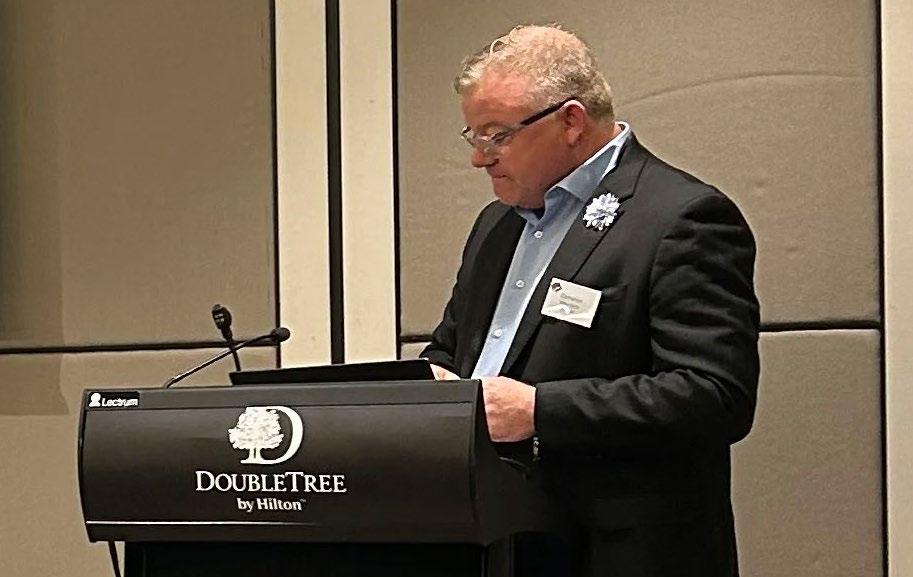

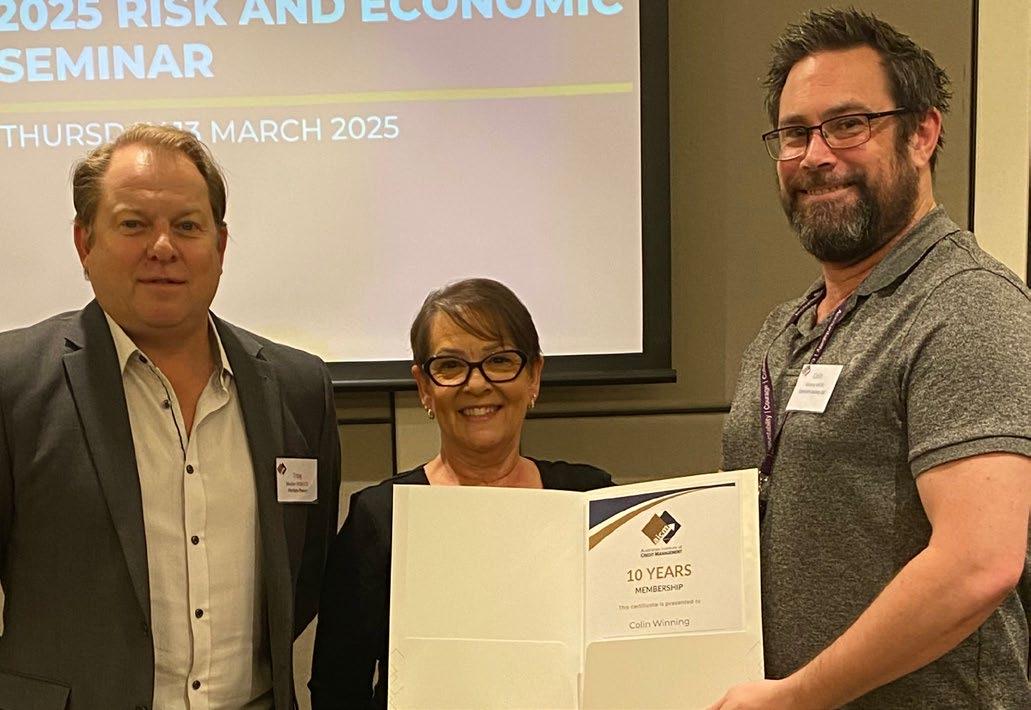
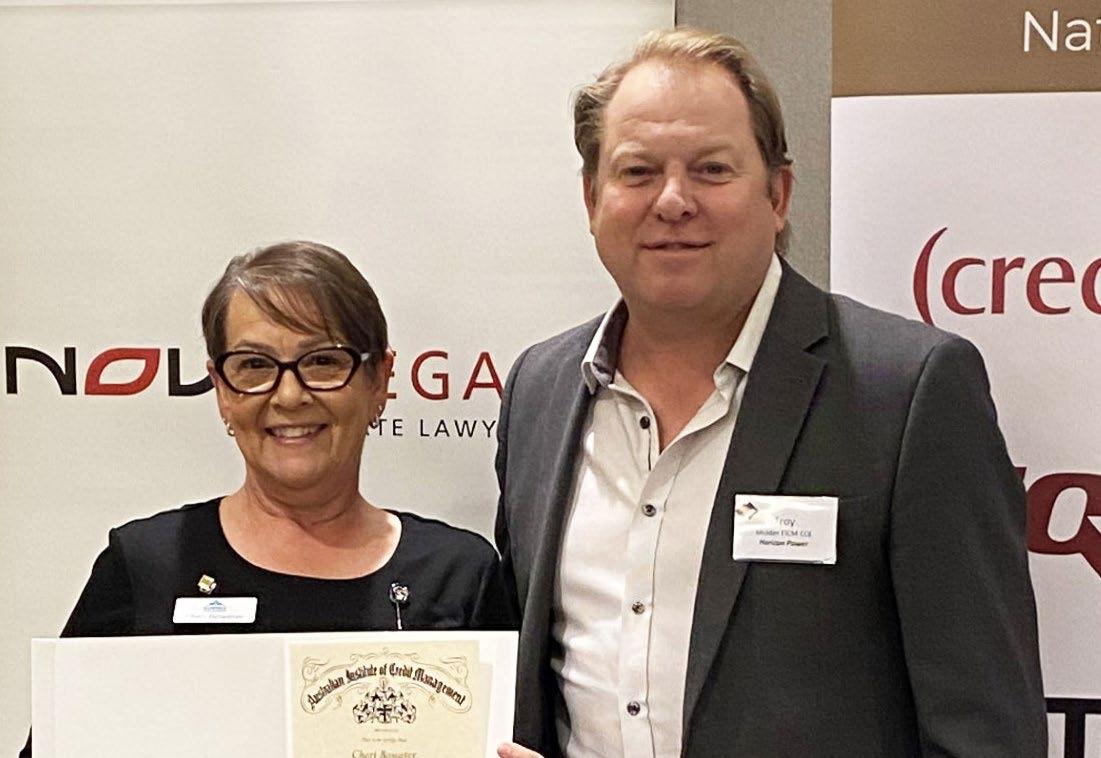
What a year we are having! Our Economic and Risk Seminar on 13th March was well attended and our Guest Speaker from the Reserve Bank of Australia was James Holloway (Deputy Head, Economic Analysis Department) who provided us with the most interesting and innovative updates happening in Australia at the moment.
Our CEO Nick Pilavidis gave us an update on Risk with input from Malcolm Field from SV Partners, David English from Bunnings, Thomas Banfield from Turks, Cameron Miller from Equifax, and Troy Mulder from Horizon Power. Subjects covered were Fraud and Cybersecurity, AI & Technology, Bankruptcy, and Insolvency and Preparing for the 2025 Challenges ahead. For Credit Professionals,



this seminar was invaluable for information sharing.
Last Friday, 9th May, we had our Annual Golf Day at Collier Park and it was just fabulous, great weather, even better company and loads of fun playing an Ambrose Game! Everyone is already looking forward to next year! A huge thank you to NCI for sponsorship of the event and to Equifax for providing prizes for the winners. Thanks to Auxillium, AMPAC, SV Partners, Equifax and NCI for putting in teams. Onwards and upwards next year for double the amount of teams!
We have our Young Credit Professional of the Year and Credit Professional of the Year awards in August and the applications close off 31st
May 2025! Please have a think about applying for one of our WA Awards, it is a wonderful addition to your resume and the prize for first place is a trip to Conference in October to represent WA!!!
WA is having our Women in Credit Luncheon on Friday 6th June at 12pm at the Doubletree by Hilton Waterfront and it’s sure to be an unforgettable event with the Honourable Simone McGurk MLA as our guest speaker. We invite you all to come along for this special luncheon celebrating WINC for 10 years!
Take care out there everyone and have a good time at the upcoming AICM Events.
– Cheri Bowater FICM CCE WA Division Council President.

South Perth’s Collier Park Golf Course played host to another unforgettable AICM Golf Day recently, bringing together players of all skill levels for a day of friendly competition, stunning scenery, and perfect weather. The event, held at the picturesque 27-hole championship course just 10 minutes from Perth’s CBD, was a great success with clear skies and warm sunshine setting the stage for a memorable outing.

We played the Lake and Island 9-hole courses this year, which offered participants a diverse and challenging experience. The well-maintained fairways, manicured greens, and scenic surroundings, complete with pine trees and local wildlife, created an ideal backdrop for the day. The course’s reputation as one of Perth’s premier public golf facilities was on full display, with players enjoying the blend of accessibility and quality that Collier Park is known for.
The weather couldn’t have been better, with bright, sunny conditions and a gentle breeze ensuring comfortable play throughout the day. NCI reprised their role as sponsor of the drinks cart
which kept our golfers hydrated throughout the day. This support is greatly appreciated!
The event wasn’t just about golf; it was about bringing our credit community together. Players mingled afterwards at the fully licensed venue offering light refreshments, a sausage sizzle dinner and open bar facilities. It was the perfect spot to relax, share stories, and celebrate the day’s highlights.
Equifax generously provided the prizes for the winning teams with Summit Fertilizers supplying all teams with gift packs for attending. This year in an upset, the AMPAC team stormed home to come first overall, playing a stunning round of golf to pip

the perennial favourites, NCI & Auxilium Partners to the post. This will no doubt increase their hunger to come back next year to snatch the title.
For those who missed out, keep an eye on the AICM website for updates on upcoming events, including next year’s golf event, and further AICM seminars and networking outings. A big thank you to all the participants, staff, and volunteers who made the Golf Day a hole-in-one success!
Nirav Shah SV Partners
Can you tell us a little about your background and how you got into the insolvency profession?
Born and brought up in Nairobi, Kenya and after completing high school, came to Perth to pursue an accounting major with economics at Curtin University. Upon graduating, I attended a careers fair in search of professional employment. I applied for a position with most of the firms that were present as a result of not being certain on what area of accounting I wanted to work in. The very first firm that offered me a position was an insolvency practice, so I basically landed in the profession. Little did I know at the time that it would turn out to be a career.

What inspired you to pursue a career in insolvency?
It brings a great sense of purpose to provide (or at least try to) the best outcome for all stakeholders involved.
What has been the most surprising thing you’ve learned since starting in this field?
Wow, that is a tough one. I would have to go with things are seldom what they appear to be.
What does a typical day look like for you in your current role?
It basically involves monitoring of my files, delegation of tasks to colleagues and supervision of same. There are times where, I would be reviewing files and considering next steps/course of action which changes very quickly where it’s all hands-on deck when new appointments (files) come in.
What’s the most rewarding part of your job?
Being able to assist distressed companies and individuals and giving something back to the creditors by way of a dividend distribution.
What skills do you think are most important for success in the credit/insolvency profession? Be empathetic and sympathetic. Be a good listener. Document conversations. Do not take things personally. Remain calm in all your dealings.
What are your professional goals for the next five years?
Continue to progress my career, upskill, and be a mentor to my colleagues.
How do you balance your work life with your personal life?
Try not to think of work outside of work. Focus on outside interests.
Advice and Perspectives
What advice would you give to someone just starting out in the credit field?
Be a sponge and follow instructions to the letter.
What common misconceptions do people have about working in insolvency?
We lack sympathy and empathy. We act only in our best interests.
How do you handle stress and maintain a positive attitude in a demanding job?
Keep calm. Don’t take things personally and if things get stressful, take a break from it by attending to other tasks.
Fun and Personal Interests
What do you like to do in your free time when you’re not working?
Spending time with my wife. Catching up with friends. Explore new places. Experiment in the kitchen. Try to stay fit and sleep in (where possible). Netflix and chill.
If you could have dinner with any credit professional, past or present, who would it be and why?
Jeremy Coote – he’s a good bloke.
What’s your favourite book or movie, and why?
I’d have to say the very first Mission Impossible because of all the stunts that looked real at the time.
How do you see the credit industry evolving in the next decade?
Involvement of AI and more stringent barriers to obtain credit.
What role do you think young professionals
play in shaping the future of insolvency/credit management?
Indeed, a very pivotal role as they are the next generation leaders of the profession.
How can the credit community support young professionals better?
Perhaps offering mentorship opportunities/ casual catch-up sessions with more experienced professionals.
Coffee or tea? Tea. Favourite app or tool you use at work? Outlook calendar.
Best piece of professional advice you’ve ever received? When in doubt seek independent professional advice.
The Australian Institute of Credit Management welcomes our Partners for 2025
Our National, Divisional and Professional Partners support and work with the AICM to promote the Institute’s activities, represent the Credit Industry and develop the careers of all Credit Professionals. As these organisations support your Institute and your Industry please consider them when you require assistance.

The SA Council started 2025 with a bang at the SA Division Barefoot Bowls event on March 14th at Torrensville Bowling Club. Enthusiastic participants enjoyed a fun-filled day of bowling, with some fantastic winners emerging not just in the game but also in the prize draws. Special kudos to Lisa Anderson and Elizabeth Dobbie for their stellar BBQ skills, especially given the scorching Adelaide heat. Their efforts ensured no one went hungry, and the networking opportunities were abundant.
On March 18th, the SA Economic and Risk Seminar at the Arkaba Hotel proved to be another triumph. Susan Stone, Chair of Economics at Credit Union SA and University of SA, shared invaluable insights into the current economic landscape. CEO Nick Pilavidis further enriched the discussion with his analysis of recent trends in the credit industry. The Legal and Insolvency panel, chaired by Nick and featuring Allan Kawalsky from Turks and Victoria Young from HPL, provided a deep dive into industry happenings, sparking engaging questions from the audience. The seminar concluded with SA Councillor Robin Matters leading a Credit Risk panel featuring Hudson Pitt, Lisa Anderson, and Kathleen Lenton. Their wealth of knowledge fostered stimulating discussions among likeminded credit professionals.

Looking ahead, the WINC Luncheon on June 20th at Kooyonga Golf Club promises to be a highlight. Celebrating a decade of achievements for women in the credit community, attendees are encouraged to wear something that glitters, sparkles, or shines. This year’s charity partner is Good360 Australia. The event will feature the Hon Michelle Lensink MLC, Shadow Minister for Planning and Housing, Human Services, Women, and the Prevention of Domestic, Family, and Sexual Violence. It’s set to be an empowering and memorable luncheon.
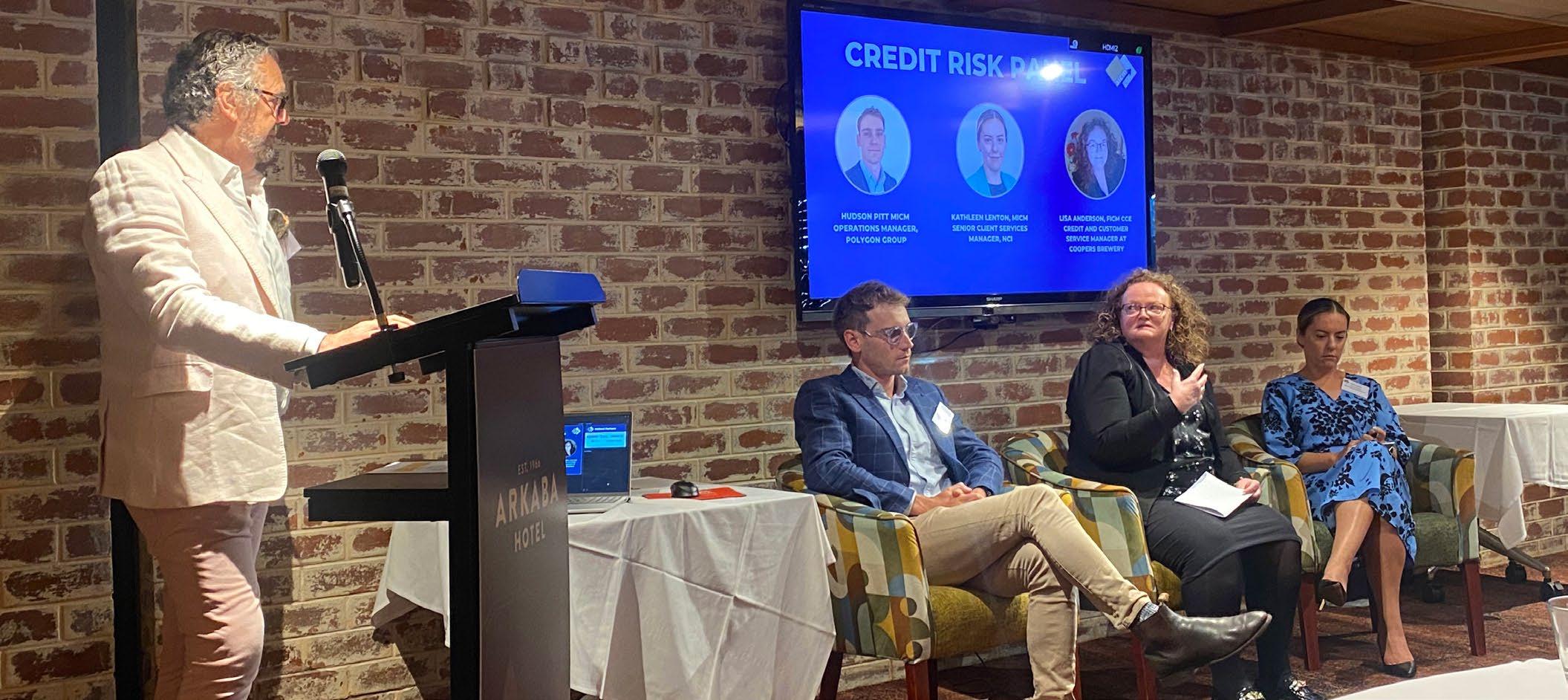

As we move into the middle of the year, the focus shifts to the SA Trivia Night, followed by the YCP and CP Awards night in September. These events will spotlight emerging talents and seasoned professionals, offering a fantastic platform for recognition and celebration within the credit community. We encourage all eligible individuals to apply for the awards and join us in celebrating each other’s successes.
Stay tuned for more exciting updates and events from the SA Council!
The Australian Institute of Credit Management welcomes our Partners for 2025
National Partners
Divisional Partners

Official Division Supporting Sponsors
Our National, Divisional and Professional Partners support and work with the AICM to promote the Institute’s activities, represent the Credit Industry and develop the careers of all Credit Professionals. As these organisations support your Institute and your Industry please consider them when you require assistance.



2025 is already shaping up to be a memorable year – and as they say, time flies when you’re having fun. And what better way to kick things off than with one of our most anticipated events – the AICM Vic/ Tas Golf Day.
Now in its 19th year, this fantastic day on the green wouldn’t be possible without the tireless efforts of Lou and his dedicated team. I had the pleasure of participating for the first time this year, and while my team proudly took home the NAGA award – affectionately dubbed “Not Another Golf Award – the real win was the camaraderie and connection shared by all.
As much as we enjoy our social events, what truly sets the AICM apart is the strength of our professional community. The recent Risk & Economic Seminar event was a powerful gathering
of credit professionals in varying degrees and positions, bringing together insightful perspectives on the key challenges and opportunities ahead in 2025. It’s this type of collaboration that reinforces the value of our industry and our association.
Looking ahead, we’re especially excited to host the first luncheon in our WINC Luncheon Series. This event celebrates the achievements and voices of Women in Credit and the hard work they have done. It makes it even more special that for another consecutive year, all AICM Division Presidents are women. We continue to build on the foundations laid by the inspiring leaders before us, whilst creating our own legacy.
I encourage you to keep an eye on the calendar for other upcoming seminars and networking opportunities. Lastly, a heartfelt thank you to the Vic/Tas council members – your commitment and




behind-the-scenes efforts continue to drive our success.
Here’s to an already fantastic year and an even more prosperous year ahead.
On Friday, 21st February 2025, we hosted the 19th Annual Vic/Tas Golf Day at the prestigious Southern Golf Club. A highlight of the year for many and once again this year blessed with perfect weather, the event brought together members of the credit management community for a day filled with networking and friendly competition.
Set against the backdrop of lush green fairways and clear skies, participants had the opportunity to showcase their golfing skills – or, for some, to dust off their clubs and enjoy a relaxed round with
industry peers. The day was a testament to the strong connections within our community and the shared passion for both the profession and the sport.
The success of the Vic/Tas Golf Day would not have been possible without the generous support of our sponsors, the dedication of our volunteers, and the meticulous planning by our organisers.
A heartfelt thank you to:
l Equifax – Naming Day Sponsor
l IODM – Slushy machine Sponsor
l NCI Trade Credit solutions – Drinks Cart Sponsor
l Opypro – Winning Team Sponsor
l SPK Glass & Aluminium – Prawn BBQ Sponsor
Special thanks to Lou Caldararo, Brian Kay, and Mary Petreski for their invaluable contributions on the day. Their efforts ensured a seamless and enjoyable experience for all attendees.


We also extend our gratitude to all our hole sponsors and look forward to your continued support in the coming years.
Next year marks the 20th anniversary of the Vic/ Tas Golf Day, and we are already looking forward to celebrating this milestone with an even bigger and better event in 2026! Make sure to book early, spots are limited!

On 20th March, the AICM hosted the 2025 Vic/ Tas Risk & Economic Seminar at Batman’s Hill on Collins in Melbourne, bringing together credit professionals from across the region for


an afternoon of valuable insights, meaningful conversations, and practical takeaways.
The event began with a well-attended Credit Networking Forum over lunch, where professionals connected and shared thoughts on the current challenges shaping the credit environment. The rest of the afternoon featured a strong program of sessions covering a wide range of relevant topics.
Presentations explored areas such as fraud prevention, cybersecurity, and how organisations are approaching AI adoption in credit risk management and fraud detection. Collections performance and strategies to address rising DSOs were also a key focus, as was the importance of preparing for emerging risks in 2025, including ESG expectations and ongoing economic uncertainty.
Legal and insolvency developments were


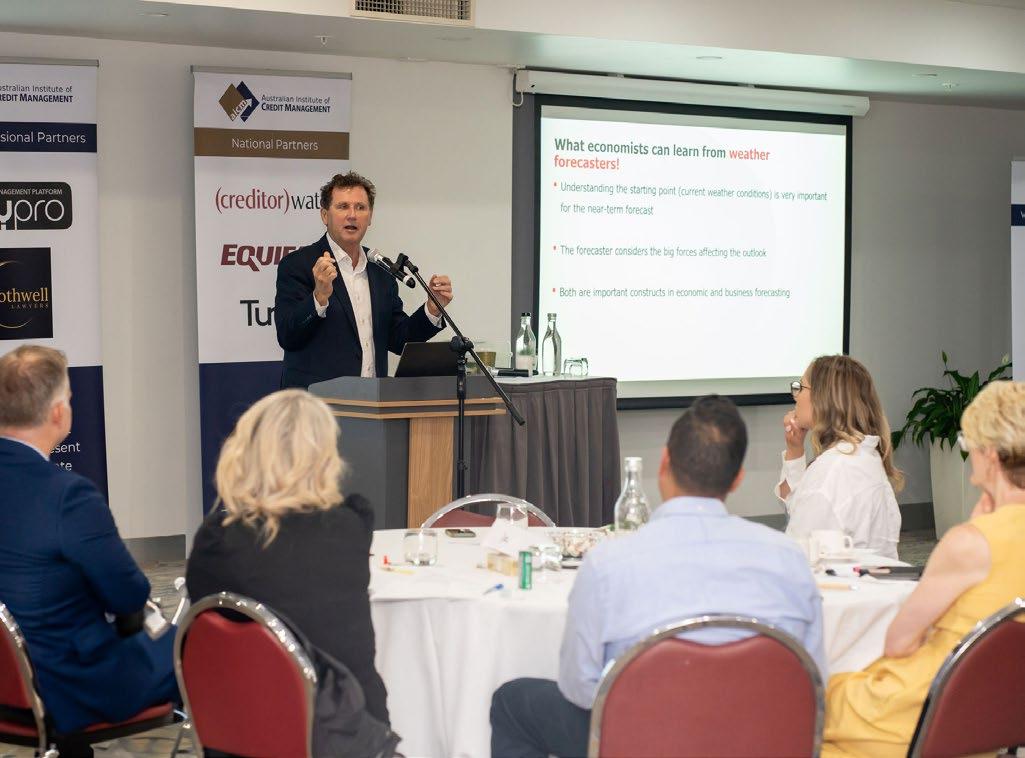
The Australian Institute of Credit Management welcomes our Partners for 2025
National Partners
discussed in detail, with thoughtful contributions on how creditors can navigate the increase in small business restructurings, deal with unfair preferences, and apply the PPSA more effectively. These sessions provided attendees with clear, practical guidance relevant to their day-to-day challenges.
We were fortunate to hear from a fantastic group of speakers throughout the afternoon, including Ivan Colhoun, Nick Pilavidis, Allan Kawalsky, Renee Di Carlo, Mary Petreski, Carole McTavish, Joseph Bonvino, and Amanda RothwellHiscock. Their experience and insights helped make the seminar informative, well-rounded, and engaging from start to finish.
Thank you to all our speakers, organisers, and attendees for making this year’s Risk & Economic Seminar another successful event. We look forward to welcoming you back in 2026!
Divisional Partners



Official Division Supporting Sponsors


Our National, Divisional and Professional Partners support and work with the AICM to promote the Institute’s activities, represent the Credit Industry and develop the careers of all Credit Professionals. As these organisations support your Institute and your Industry please consider them when you require assistance.



What a start to 2025! After the huge momentum we carried out of last year, it’s been fantastic to see the QLD credit community continuing to show up, get involved, and support one another.
Our annual Trivia Night was a sell-out success – a big thank you to everyone who brought their A-game (and their best team names) for a night full of laughs, friendly competition, and great company. We also successfully rescheduled and delivered our Risk Seminar, which turned out to be a fantastic session full of practical insights and engaging discussion– well worth the wait after Cyclone Alfred delayed our original date!
Up next on our PD calendar is Accounting 101 for Credit Professionals. Whether you’re early in your credit journey or just want a refresher, this one’s not to be missed.
We’re also gearing up for awards season, and I can’t wait to see the nominations roll in for Credit Professional of the Year and Young Credit Professional (YCP). These awards are a brilliant way to celebrate the outstanding talent we have in QLD, and I encourage you to recognise your colleagues (or yourself!) by applying.
As always, a huge thank you to our amazing sponsors, members, and council – your continued support drives everything we do. Looking forward to seeing you all at our upcoming events!

– With Julie McNamara
From the original WINC event back in 2015 I don’t think anyone could have known what it would become of today. The event of the WINC calendar, the most sold out event in Queensland, it’s almost like getting tickets to the Oscars it’s such an event.
It has certainly evolved over the years to become the event of the year. WINC celebrates the achievements of women and how far they have come in the Credit Industry but it has become so much more than that, it has grown to include our webinar series which focuses on women and empowering them.
I had the privilege to interview Julie McNamara our National President who was one the original organisers of the very first WINC in Queensland and has continued to be involved and attend WINC every year.


“It’s been a wonderful journey and to have had the support from Equifax, Results and NCI has been amazing through the years. It has been a very successful event for everyone.”
Queensland has continued to have a huge response to WINC, with sell out events each year. Why do you think the response is so big for this event?
It’s hard to pinpoint as there would be a number of factors that would contribute to this from word of


mouth and the general feedback that people love the event. Our QLD President Stacey Woodward really drives the event and has assisted in its continual growth. The council continue to deliver with excellent venues each year from listening to the feedback of members.
How has WINC evolved from the first WINC in 2015?
I can remember putting a panel together for the very first WINC and wondering how it would go. NSW was holding a lunch for their first WINC, so it was a bit different for us to also have a panel. It was great to have the support from the beginning and to see where we have got to now. The event appeals to such a broad range of people and
although it is Women in Credit there are many men who also attend, and this has continued to grow. The charities over the years and the guest speakers have been amazing and so inspirational. So many of our attendees have grown with this event and followed it and the support that is given to the charities is beyond what could have been expected.
This year’s charity partner is Good360 who are also celebrating 10 years of meaningful impact. Why do you think our charity partners are so important?
Having the charity partner gives us all purpose, it gives us all chance to help when in ways we may not normally be able to. Unfortunately, we don’t always have the time to volunteer our time but by having the charities come along we can listen to their stories, there is always some way that it impacts our lives that we are able to walk away with or pass on the details to someone in need or being able to donate. The Charity Partner is critical to the theme of WINC, and it is great to be able to tie it into our event.
Last year’s Charity Partner Orange Sky inspired one of my employees at the time to volunteer with the charity after listening to them speak and continues to do so. I could not be prouder of her.


You know it’s going to be a great night when you walk into a room full of familiar faces, lively conversation, and laughter echoing all around. The Stock Exchange Hotel was the perfect venue for our first event of the year, providing a vibrant and welcoming space that set the tone for a fun-filled evening.
As always, the event was a sell-out! We were thrilled to welcome many new members alongside our AICM regulars, creating a fantastic mix of people. Teams were made up of work colleagues, long-time friends, new acquaintances, and members of the Queensland Council, who were scattered among the groups to join in the fun.
Creativity was on full display with team names like Credit Crushers, Collections & Corrections, Loan
Rangers, and Devils Advocate bringing plenty of laughs before the trivia even began.
If you’ve been to one of our trivia nights before, you’ll know the questions cover a wide range of topics – Sports, General Knowledge, Music, Movies, and this year, Logos made an appearance too. It’s the perfect chance for everyone to shine as a subject matter expert!
The competition was tight, with just one point separating the top two teams. The Orange Frogs took out first place with 68 points, closely followed by The Devils Advocates on 67. The Darts may have claimed the wooden spoon, but they still put in a strong showing with a respectable 51 points.
All in all, it was a fantastic night of friendly competition, laughs, and community spirit. Before we knew it, the evening had flown by. We can’t wait to see everyone at the next event!

Highlights from this year’s Qld Risk and Economic Seminar
10 April 2025
This year’s annual seminar almost didn’t happen. With Cyclone Alfred making landfall in Brisbane, the city came to a standstill – roads closed, public transport halted, and residents advised to stay home. For many, the eerie quietness was a flashback to the early days of COVID-19. Fortunately, the storm was short-lived, and while the event had to be rescheduled, the revised date delivered a seamless and insightful afternoon of discussion, learning, and professional connection.

When the seminar finally went ahead, Jordan McNee took the reins as MC and ensured the packed program ran smoothly and on time. A key moment was the recognition of membership milestones – a tradition that underscores the dedication and longevity within our professional community. Congratulations to:
l Michelle Jackson – 5 years
l Belinda Hill – 5 years
l Mark Joubert – 25 years
Insights with Justin Green (NAB)
Justin Green from NAB returned with another dynamic presentation – though he had to pivot quickly due to fast-changing economic data triggered by the latest Trump-era tariffs. With
humour and clarity, he described the modern economist’s dilemma: “We’re like dolphins –intelligent but unable to speak human. My job is to translate.”
Despite the volatility, Green reassured attendees that Australia’s economy remains well-positioned: full employment, controlled inflation, and strong business confidence, particularly in Queensland. NAB now forecasts a 250-basis-point rate cut by February 2026, and while real incomes remain flat and construction productivity is lagging, broader business conditions and consumer confidence are stabilising.
Nick from the AICM shared findings from the latest member risk survey, highlighting critical issues


such as fraud, cyber security, and the importance of early and proactive customer engagement. Emerging trends include growing adoption of AI and analytics, as well as increasing attention to ESG (Environmental, Social, Governance) responsibilities.
Marielle Delgado from the ATO delivered one of the most anticipated sessions of the day. Her focus: the ATO’s sharper, faster approach to dealing with non-compliance. With collectible debt rising –especially from small businesses – the ATO is taking firmer actions sooner, including director penalty notices and public debt disclosures. However, they also remain

supportive, with increased uptake in payment plans and Small Business Restructuring (SBR) arrangements.




Steven Staatz (Vincents) and Nicholas Boyce (Results Legal) offered a legal and insolvency update, focusing on SBRs and the sectors under pressure – particularly construction, hospitality, and retail. They clarified key aspects of SBRs, such as creditor rights and the importance of PPSR registration. Their message was clear: creditors need to understand their legal protections and act early, particularly as ATO scrutiny intensifies.
Fiona Reynolds from Turks led a thought-
provoking panel with Michelle Jackson (Cleanaway), Christopher Cohen (BOQ), and Samuel Lane (Agility Law).
l Chris shared how BOQ emphasises team wellbeing to enhance empathetic customer engagement.
l Michelle discussed her use of AI for document summarisation and credit monitoring, stressing the value of a clear AI policy.
l Samuel explored legal risks, from cybercrime to unfair contract terms.
l The group also delved into ATO default monitoring, system upgrades, and the fine balance between risk management and relationship maintenance.


As the formal program concluded, attendees gathered for canapés and drinks at the outdoor bar, taking advantage of Brisbane’s nowcooperative weather. The mood was upbeat, with conversations flowing and new connections forming – a fitting close to a day that proved the value of flexibility, insight, and community.
Join us on the Gold Coast for the 2025 AICM National Conference
We’re thrilled to announce that the AICM National Conference is returning to the Gold Coast, hosted at the stunning JW Marriott Gold Coast Resort & Spa. There’s no better backdrop than Queensland’s




sun-soaked coastline, and we’re proud to welcome credit professionals from across the country to this iconic location.
While the conference promises an actionpacked agenda filled with insights, learning, and networking, we encourage you to take some time to explore everything the Gold Coast has to offer. Whether you’re a first-time visitor or a regular, the region never fails to impress.
l Surfing Paradise: Catch a wave at worldrenowned beaches like Snapper Rocks and Burleigh Heads.
l Theme Park Capital: Experience the thrills at Dreamworld, Sea World, Warner Bros. Movie World, and Wet’n’Wild.
l City of Skyscrapers: Marvel at the Q1 Tower, one of the tallest residential buildings in the Southern Hemisphere.
l Natural Wonders: Discover lush rainforests, wildlife sanctuaries, and breathtaking scenery in the Gold Coast Hinterland and Springbrook National Park.
l Sunshine Galore: With around 300 sunny days a year, the climate is perfect for beachside relaxation or outdoor adventures.
This luxurious beachfront property offers a perfect balance of relaxation and activity. After a major refurbishment in 2020, the resort now features elevated amenities while maintaining its signature coastal charm. A highlight is the saltwater lagoon, home to over 200 tropical fish – ideal for snorkeling, Sea-Doo scooter rides, or simply unwinding on its sandy edges. It’s an oasis you won’t forget.
If you haven’t taken advantage of the early bird registration, now’s the time! We can’t wait to welcome you to the Gold Coast for what’s set to be another memorable and inspiring AICM Conference.
See you there!
Anna Taylor MICM Results Legal
Tell us a bit about your company – How long you have been around, number of employees, main focus of business etc.
Results Legal is a specialist commercial disputes and commercial law firm based in Brisbane, Queensland. We’ve been operating for over 16 years, providing expert legal advice and solutions primarily in the areas of commercial litigation and dispute resolution, insolvency and restructuring, and debt recovery. While our size can fluctuate, we typically have a core team of around 40, including experienced solicitors, paralegals, and support staff. Our main focus is on achieving practical and effective outcomes for our clients, understanding their commercial realities, and providing clear, strategic advice.

Why did you choose to be a divisional partner in Qld for the AICM?
Becoming a Divisional Partner for the Australian Institute of Credit Management (AICM) in

Queensland was a strategic decision driven by several key factors. Firstly, a significant portion of our practice at Results Legal involves commercial litigation and dispute resolution debt recovery and insolvency, making us connected to the credit management industry. Partnering with the AICM allows us to directly engage with professionals in this sector, share our expertise, and contribute to the development of best practices.
Secondly, we recognise the vital role the AICM plays in supporting and educating credit professionals. By becoming a partner, we can actively contribute to the Institute’s initiatives, offer our legal insights through presentations and resources, and help raise the profile of the credit management profession within Queensland.
Finally, we see it as an opportunity to strengthen our relationships within the Queensland business community. The AICM provides a valuable platform for networking and collaboration with credit managers, finance professionals, and other businesses.
Personally, how long have you been a member of the AICM?
Personally, I have been a member of the AICM for approximately 14 years.
What benefits do you get from being a member?
AICM membership provides us with professional development opportunities, keeps us connected with a valuable network of industry professionals, and offers access to key industry insights. It also allows us to contribute our legal expertise to the credit management community.
What do you enjoy about attending the events that are held?
AICM events are great for gaining practical

knowledge from presentations and workshops, connecting with peers and industry leaders, and learning from their experiences. They help us stay up to date with the latest in credit management and allow us to actively support the profession’s growth in Queensland.
The Australian Institute of Credit Management welcomes our Partners for 2025






Our National, Divisional and Professional Partners support and work with the AICM to promote the Institute’s activities, represent the Credit Industry and develop the careers of all Credit Professionals. As these organisations support your Institute and your Industry please consider them when you require assistance.


We kicked off 2025 with a fantastic start at the NSW Risk and Economic Seminar on 11 March, held at the iconic Parliament House in Sydney. With speakers from the credit and finance world, the event covered everything from economic shifts to legal and operational trends shaping our industry. The presentations and panel session were full of valuable insights, and it was great to see such strong engagement from everyone who attended.
Next up, we’re gearing up for our alwayspopular Trivia Night – and this year it’s a “Battle of the Generations”! It’s shaping up to be a fun, jampacked night with plenty of laughs and friendly
rivalry. Whether you’re a Baby Boomer or a Gen Z whiz, we hope to see you there for a great evening of connection and competition.
We’re also in full swing preparing for awards season, with interviews and planning well underway for the Credit Team of the Year, Credit Professional, and Young Credit Professional categories. It’s always a highlight to recognise the talent and hard work across our industry, and as councillors we have the privilege to meet with the candidates. It’s a highlight of the year for many of us and this year will be also hoping to repeat our 2024 success where a NSW candidate won Credit Professional of the year.
– Sev Indrele MICM CCE, NSW President
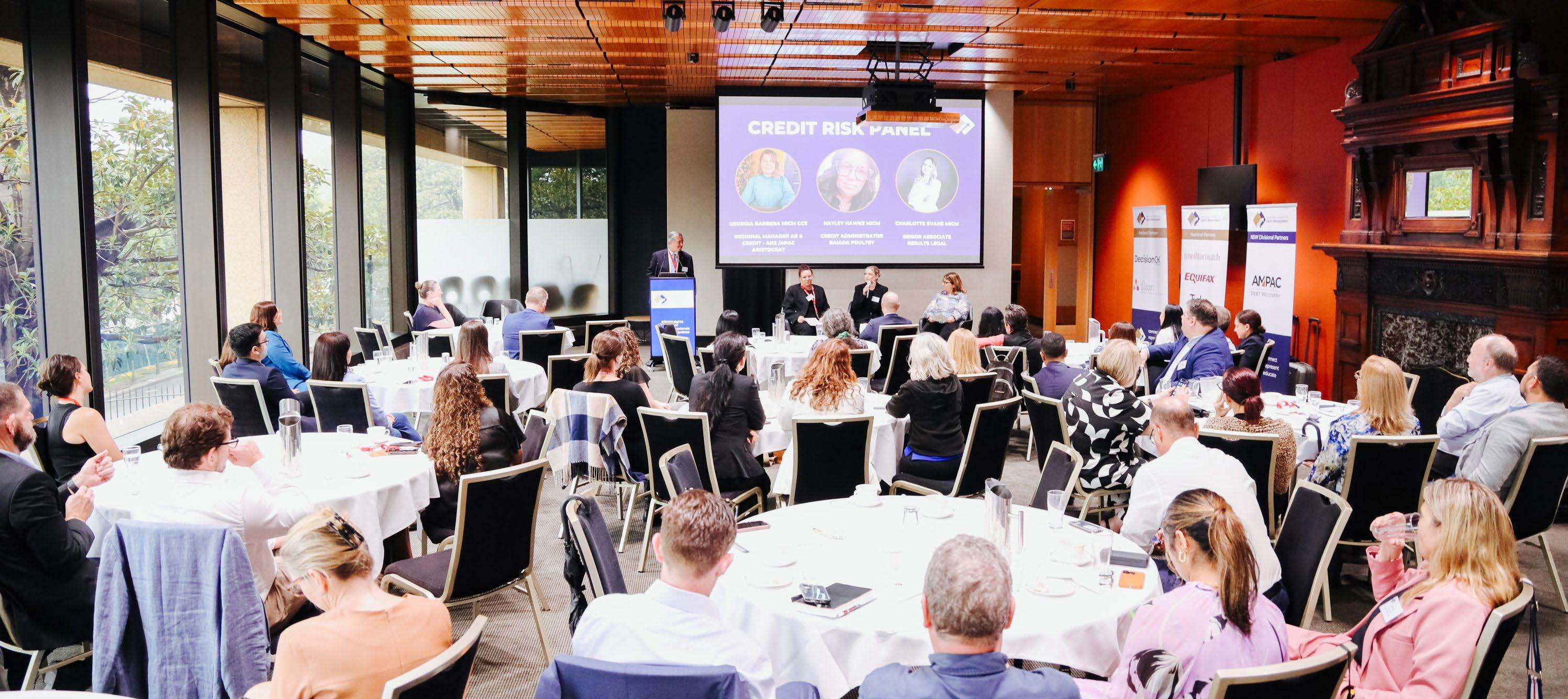

The 2025 NSW Risk and Economic Seminar 2025 convened on 11 March at the NSW Parliament House, Sydney. Attended by 55 credit and finance professionals, the event provided a comprehensive program addressing key economic, risk, legal and operational trends shaping the credit industry.
Master of Ceremonies, Theresa Brown MICM CCE, opened the seminar by welcoming delegates, acknowledging the event’s National Partners – CreditorWatch, Equifax, illion, Turks, and DecisionOk – and Divisional Partner AMPAC.

A working lunch featuring an Italian menu allowed delegates to network informally before the formal sessions commenced. The Credit Networking Forum, moderated by MC Theresa Brown, encouraged table discussions on current credit challenges and innovations, fostering collaborative insights from across the room.
The first keynote presentation was delivered by Ivan Colhoun, a respected Chief Economist, who provided a detailed Macro-Economic Update. Ivan’s address focused on national and global economic indicators, interest rate trajectories, and their anticipated impact on business



operations in 2025. Following a short intermission, Nick Pilavidis FICM CCE, AICM CEO, presented the Risk Outlook. His session explored the latest insolvency statistics, emerging payment behaviours, and AICM’s ongoing advocacy efforts regarding legislative reforms. Nick also unveiled results from the recent AICM Risk Survey, offering a timely barometer of member sentiment and risk expectations.
The afternoon program continued with a Legal and Insolvency Update presented by insolvency and restructuring specialists Lachlan Wilson MICM and Andrew Spring MICM CCE. Their presentation discussed the economic pressures currently facing businesses, the Australian Taxation Office’s evolving collection strategies, and the practical

implications of the Small Business Restructuring framework.
The event concluded with a dynamic Credit Risk Panel Discussion, chaired by Joe Laban LICM CCE. Panelists Georgia Barbera MICM CCE, Hayley Hawke MICM, and Charlotte Evans MICM addressed critical operational and strategic topics, including


fraud mitigation, cyber security risks, efficiency improvements, and enforcement strategies. Audience participation was actively encouraged, allowing real-time exploration of emerging industry themes.
In her closing remarks, Theresa Brown thanked all speakers, panellists, and attendees for their valuable contributions and acknowledged the generous support of the event sponsors. Delegates were invited to continue networking at Cabana Bar, further strengthening professional relationships built throughout the day.
The AICM NSW Risk and Economic Seminar 2025 reaffirmed its reputation as a premier forum for advancing credit industry knowledge, fostering collaboration, and preparing professionals for the evolving risk landscape.


Kayla Epps MICM Team lead for Metro Finance
– Credit Team of the year 2024
Please confirm your position/company you work for currently

I’m the Novated Leasing Division Credit Team Leader at Metro Finance.
What has been your career journey?
I started my career in the early 2000s as a debt collector. It was a very different world back then. I found some of the work really unpleasant. For example, making difficult calls to elderly
customers was emotionally challenging. That wasn’t for me. I was only there a short time and was happy to start a new role in a brand-new business called Wallet Wizard. I soon became one of the first team leaders. This was before payday loans were properly regulated so it was totally different industry compared to today. I spent around five years there. Despite the limitations of that time, we aimed to provide the best customer experience possible. It was all person-to-person contact then – very different from today’s online environment but a good place to gain experience as a young person.
From there, I moved to Prospa in a Commercial Credit Analyst role. It was in commercial cashflow lending. This was a significant shift from consumer finance and gave me broad exposure to company financials and credit analysis. I also helped develop their credit decision engine, which was a big leap from the manual, paperbased processes I had started with. It was amazing to see the difference.
Next, I joined Pepper in a credit assessor role. Again, I didn’t mind stepping back into a frontline position – it gave me a chance to gain more experience and build credibility. Initially focused on mortgages, but by this time I had a lot of my own credit experience and logic to apply to property finance. The business grew and when Pepper later introduced personal loans, I became team leader in that area. I took time off for maternity leave and then COVID hit. I opted for redundancy rather than returning. I was at Pepper for five years.
That led me to Metro Finance, where I began again as a credit analyst – this time in asset finance, which was new to me. We have 3 teams at Metro Finance, consumer lending, commercial lending and Novated Leasing. I was the only one handling novated applications, but as the business grew and leadership changed, I stepped into a team leader role. This was after around 18 months at the company.
The team has continued to grow to meet business needs and now includes five analysts. Today, my focus is on building a strong, confident, and independent team. My focus is more on hiring the right people than the right number of people. With the right team members, you can achieve more. COVID taught us that flexibility and balance are possible – we can hit SLAs without burnout. It’s
“Today, my focus is on building a strong, confident, and independent team. My focus is more on hiring the right people than the right number of people.”
now been two years in this role. I enjoy leading this team that works so well as a unit.
Tell me about the credit team of the year award and why you think the judges selected you for the Credit Team of the Year?
I believe our enthusiasm and unity shone through. Despite nerves, the whole team was engaged and genuine. I think the judges could see how much we cared, and that really resonated.
I wasn’t an AICM member so had no idea about the award initially, but my department head at the time, Kate Fullbrook, who’s an AICM member, suggested we could apply. Our team had just gone through rapid growth – application volumes doubled in three months – and we kept hitting our SLAs and quality assurance milestones, so it was an impressive feat. At one point, five analysts were handling 180 applications a day. A new BDM had brought in a wave of business with no runway. We had no choice but to make process improvements to keep up on the fly. It felt like the right time to celebrate our progress.
I initially worked with my manager to submit the first application, outlining our team’s achievements. When we progressed to the next round, we received funds for a team bonding activity, which we used for a cooking class. We drew parallels between cooking and teamwork –it was a great way to reflect and connect.
When it came to the final presentation, I stepped back and let the team take the lead. They built a PowerPoint and delivered the presentation in our Metro office, with Debbie from Equifax and other judges attending. Public speaking isn’t in my comfort zone, but the team did a fantastic job. We found out we’d won the award at the AICM conference, which I attended with one colleague. It was a fantastic experience.
What has being a member of the AICM done for you? Winning Credit Team of the Year. It’s been a short time since we won, but in reflection, winning the award experience was amazing. It boosted morale and gave us an opportunity to celebrate as a team.
What is your biggest professional accomplishment to date?
It is building the team I lead now. Earlier in my career, I sometimes felt like a child leading other children. I was a team leader so young. This time, I’ve built a team I’m truly proud of – people I’ve hired, developed, and supported. It’s incredibly rewarding.
What advice can you give to emerging credit professionals?
Find a company that aligns with your values and the way you believe credit should work. Don’t try to force a fit – there are organisations out there that will be the right match. And keep showing up, even if you feel stuck. Persistence matters.
How long have you been a member of the AICM? Coming up to one year – since the AICM conference last year.
What are your favourite things to do outside of your profession?
I have a little boy who’s just started kindy and soccer, so weekends are filled with games and birthday parties. I love live music and try to make time for it – my son’s started listening too! It’s fun hearing him enjoy the same Chili Peppers songs I did growing up. I also enjoy yoga when I can, but chasing a five-year-old around usually gets me enough steps for the day!
Georgia Barbera MICM CCE
Please confirm your position/ company you work for currently I’m the Regional AR and Credit Manager ANZ|APAC at Aristocrat Technology.

What has been your career journey?
I began my career in Accounts Payable and data entry. One of my first roles was at Transfield, where I worked in Accounts Payable. It was an incredible
journey in their North Sydney Office; I learnt about so many things that helped me later in the transport and construction industries. A notable memory was visiting the Sydney Harbour Tunnel whilst it was still under construction. I spent around five years in payables at Transfield.
I moved on from Transfield and joined aviation industry with Hawker Pacific, but after a short break, I needed to dedicate some time to being a mum, so I took on a new role at Allied Couriers working in bookings in a casual position. I was fortunate to have an excellent Credit Manager there, who saw potential in me and offered me a permanent role in Credit. This was where my journey in Credit truly started. I handled reporting for AMP, one of our major clients at the time. Over four years, the National Credit Manager mentored me and helped me build strong foundational skills.
My interim National Credit manager from Allied Couriers moved to a role at Startrack Express and offered me a role there which I accepted. This was at the Minchinbury Office Depot. I was now the team leader for accounts receivables and looked after the major accounts. Here I learned valuable lessons about perishables, product lifecycles, space management, and logistics. Around this time, I also started a Diploma in Credit Management through AICM, attending face-to-face sessions at Rydges at Rosehill.
After three years at StarTrack, I was ready to move on. My next role at Coates Hire, first working at Flemington. There, I led the Major Accounts Team and worked closely with my Manager Grant Morris, and built great bond with other team leads during my time at Coates to mention Anthony Stevanja & Sev Indrele. This is when the next level of credit started. We went through major changes such as moving to Mascot which was a huge upheaval and change to team dynamics. After eight months we transitioned systems as Coates merged with National Hire, and I led a major Master Data project involving Baseplan. I was appointed to a newly created role as a Project coordinator and Analyst. Now my interest in major projects was sparked. At Coates I was involved in many other projects, including predictive data analysis and customer segmentation strategies. Working with my manager Grant, and others such as Malcolm
from Brilliant Credit Management, we optimised how to manage a 24,000-account ledger. We achieved great success with initiatives like SMS reminders, achieving a 70% customer response rate. We used a dunning system and made big changes that improved DSO. We broke down the reports to more detail so we could focus on the right metrics. Training is always important, training internal coaches was key to support Credit & Sales, another project of success was with a bulk dispute resolution platform.
The key to much of our success was getting the right customer data which we obtained from changing ERP systems and lots of hard work and to this day is key to any ERP change, a golden rule. Something I try emulating with my teams today – how to make it fun. Grant would always break things down into challenges to motivate the team.
After several years, I sought a broader opportunity and moved to Rocla Pty Ltd (Fletcher Building) as National Credit Manager, where I stayed for 8.5 years. Rocla had a strong construction focus, and I led a national team of 14. After 12months in the role, the discussions commenced of replacing our 26-year-old ERP system. I achieved centralisation model and improved process through automation and overseen system improvement to eliminate revenue leakage. We improved onboarding customers, legal compliance and more. My role was across the 4 business, so I had exposure to New Zealand and suppliers across the industry.
Following Rocla’s merger with Iplex, I transitioned to Bingo Industries as Group Credit Manager, finding the synergy of construction and waste management was a strength. There, I worked on major ERP projects, moving from MYOB to D365, my and found my golden rule of cleansing and streamlining data. I had a team of 14 and hired some of my old team from Rocla. They started as contractors but became full time and brought with their good processes. We built a strong credit culture integrated with the sales
function as sales was practically running credit team back then. We needed to work closely together and succeeded. Sales is the face, and Credit is the voice of the company. It was an eventful 3 years and fast paced. I learnt about high transaction accounts, and we brought in better policies to mitigate credit card fraud. Good credit management can prevent a lot of fraud with real time (human) voice recognition, but these traditional skills are getting less common now with automation. Having said that change is important, and we can’t just do things the same way today as 15 years ago, however we never lose sight of human element and connection, you just don’t know who your next employer will be.
In 2022, I joined Aristocrat Technology. It’s been an exciting shift into a global organisation focused on gaming and technology. Aristocrat is in a highly regulated sector where collaboration with regional sales managers and understanding regulatory frameworks is crucial. Further projects were achieved such as PCI and self-serve customer portal, current project migrating with current global ERP D365, with further review of best practise and lot more automation to the next level, that Sales & Credit are excited about. It’s been a dynamic and fascinating journey. The industry is very competitive, and answers are rarely black and white. I work a lot with the sales teams as credit is sales tool we utilise.
What is your biggest professional accomplishment to date?
One of my most recent and proudest achievements is the restructure I led at Aristocrat. While maintaining the same headcount, I restructured the team, creating pathways for coaching, mentoring, and professional development. We promoted from within, allowing team members to grow into senior roles. We also expanded to our India office, filling maternity leave cash allocations coverage to billing seamlessly. Seeing the growth and confidence of my team has been incredibly rewarding.
“Understand your product and your risk profile – they go hand in hand. Embrace automation but always collaborate closely with the broader business.”
“The AICM has provided incredible learning and validation throughout my career. Completing the Diploma helped confirm I was on the right path.”
What advice can you give to emerging credit professionals?
Understand your product and your risk profile – they go hand in hand. Embrace automation but always collaborate closely with the broader business. Develop a thick skin; Credit often doesn’t get the recognition it deserves. Be passionate, embrace change, and create an environment where you and your team can grow.
How long have you been a member of the AICM?
Although I completed my Diploma with the AICM years earlier, I’ve been a full-time AICM member for about 13 years.
What has the AICM done for you?
The AICM has provided incredible learning and validation throughout my career. Completing the Diploma helped confirm I was on the right path. Over the years, I’ve gained exposure to the evolving world of fraud detection, AI, robotics, and best practices in applications and policies. Networking through AICM has been invaluable – being in a room full of Credit Managers all speaking the same language offers unmatched learning opportunities.
How did you get involved in the NSW AICM Council?
Former President James Smith invited me to get involved, shortly after I was nominated for Credit Professional of the Year. I realised the timing was perfect – I had a strong team in place at work, and I had the capacity to give back to the industry.
What has being on Council of AICM done for you?
It’s broadened my perspective, especially working with emerging young credit professionals. Meeting and interviewing upcoming talent has been inspiring. There are so many brilliant, emotionally intelligent people entering the profession – it’s exciting to see where they will go.
What are your favourite things to do outside of your profession?
I love music and concerts – anything from AC/DC
to Celine Dion! One of my all-time favourite artists is Phil Collins. I even flew to Las Vegas to catch his final tour and then saw him again in Sydney a few months later. I’m also passionate about travelling –especially exploring the Greek Islands, though I still haven’t seen them all yet!
Thank you
– Gary Poslinsky. NSW Council
The Australian Institute of Credit Management welcomes our Partners for 2025



The Institute welcomes the following credit professionals who were recently admitted to membership between January, February and March 2025.
Adam O’Hare Metro Finance
Adriana Takahashi Metal Manufactures Pty Ltd
Amanda Guthrie Whiting Holdings Pty Ltd
Amobi Ewuzie Atradius Trade Credit Insurance
Andrew Kim Turks
Athuraliyage Gunasinghe Whiting Holdings Pty Ltd
Cesilia Sisca Susilo Omnicom Media Group
Ciawyn Schwemmer Rexel Electrical Supplies Pty Ltd
Dane McDonald Atradius
Daniel Roche Whiting Holdings Pty Ltd
Debbie Robinson Clifford Hallam Healthcare Pty Ltd
Dolly Udani Whiting Holdings Pty Ltd
Elizabeth Pastourmoglou Whiting Holdings Pty Ltd
Elizabeth Succar Turks
Elizabeth Fox Metcash
Erika Peverari Metro Finance
Firoz Khan Business NSW
Ines Nikolic Oakbridge Lawyers
Jaylin Zhang Toyota Finance Australia Limited
John McInerney Grant Thornton
Julian Jr. Dee Chung Holcim (Australia) PTY LTD
Kayla Epps Metro Finance
Laura McCulloch Metal Manufactures Pty Ltd
Laura Brundle
Mathew Burton Metro Finance
Matthew Achmar Talent International
Murray King Equifax
Nataliia Poloziuk OOCL (Australia) Pty Ltd
Nelam Nordin ADT Security Group
Nimali De Silva Coface Australia
Rochelle Hallasso ARMA
Roseann Tiqui Bidfood Australia
Sairam Shankar IPF Digital
Sonia Balada Vinidex
Soo Koo Mitsubishi Electric
Sudhir Bakre Angle Finance
Suzie Theoharis Bidfood Australia
Tarnya Baohm Equifax
Thomas Haire Talent International
Timothy Yang Metro Finance
Tracey Johnstone-Kemp Coates
Ramakrishnan D V Adidas
Remin Raphael Alappatt Warba Bank
Saeed Ahmed American Home Assurance Company
Aaron Jones Access Intell
Adam Biddles Biddles Legal
An Cocolas SLF Lawyers
Brendan Mann QRIDA
Cathy MacTaggart The University of Queensland
Chad Morrison Finance One
Charlotte Masters Beaulieu of Australia
Ciara Foley Results Legal
Corey Massingham Finance One
Daniel Lewis Chesterfield Capital Pty Ltd
David Phang Finance One
Deborah Katie Kaiser QRIDA
Grace Sutton BGW Group
Jackie Sallaway Sliqpay
Jacob Searle Results Legal
James Kassulke Finance One
Janine Meizner Finance One
Jennifer Byrne QRIDA
Jessica Bester National Collection Services
John Walton Access Intell
Jose Hernandez Access Intell
Julia Crichton Stoddart Group
Julia Hartley Results Legal
Justin Simons Finance One
Kanureet Dhillon Endeavour Foundation
Kylie Kershaw Finance One
Kylie Capodieci Shell Energy
Lachlan Manton Turks
Lafaele Tafau Cleanaway
Malinda Fraser Eagers
Mansi Shourie Brisbane City Council
Maree Cunningham-Nankervis Beaumont Tiles
Matthew O’Driscoll Finance One
Motekiai Kite Cleanaway
Myles Frlan QRIDA
Noel Diaz The University of Queensland
Penelope Neidhardt Bretts Pty Ltd
Peter Chadwick BGW Group/CNW Pty Ltd
Phoebe McMaster BGW Group
Rachel Turk RMT Legal
Sam Vlahos National Collection Services
Saroj Kafle Access Intell
Shonel Bates NCS
Sophie Wilkinson Results Legal
Valentina Kiseleva Eagers Automotive Group
Valerie Ni QRIDA
Vivian Zheng Blue Sun Group
Zachary Hawes Finance One
Cassie Kent Southern Steel
Elias Hatzopoulos Oracle Insolvency Services
Gia Van Zyl Lynch Meyer Lawyers
Hanson Shang CCC Financial Solutions
Hayley Ross Bunzl Australia
Joanna Moore Hallett Group
Joshua Dasari Oracle Insolvency Services
Karen Sim Detmold Group
Lachlan Rees Oracle Insolvency Services
Madison Lawler CCC Financial Solutions
Mohamed Shumraz Ishrath Beyond Bank Australia
Olivia Bolton Lynch Meyer Lawyers
Andy Limnios Energy Power Systems Australia Pty Ltd
Anthony Tran Access Intell
Becc Sharrock Saputo Dairy Australia
Belinda Voges Metro Finance
Christina Fallone SLF Lawyers
Chun Lung Siu Toyota Financial Services Australia
Damian Rodman Aurora Energy
Danni Donmez Maddocks
Ellie Kate Matthews Aurora Energy
Emily Thompson TruePillars Lending
Emma Meade Bunzl Australia
Hayley Wood Aurora Energy
Holly Finlay New Balance
Holly Terare Aurora Energy
Jacqui Oakley Bluescope Steel
Jasmin FItzgerald Aurora Energy
Kai Him Chan WEX Inc
Kate Pruis Saputo Dairy Australia
Kerrie Hughes Remedy Kombucha P/L
Kim Thompson Bunzl Australia
Maddie Dowden Visy
Maria Donoso Contreras BCC Trade Credit
Maria D’Cruz Clifford Hallam Healthcare Pty Ltd
Maureen Petros Danaher Moulton
Megan Han Bluescope Limited
Melissa Dowling Aurora Energy
Natasha Barion Tyremax
Olivia Clayton Aurora Energy
Paul Dubuisson-Perrine
Robert Puckey Aurora Energy
Rosy Tovilo Visy
Ryan Tasker RedZed Lending Solutions
Sally Harkin Metal Manufactures Pty Ltd
Sara McAlinden Energy Power Systems Australia
Sarah McCabe Bunzl Australia
Sheriah Kumar Opypro
Vladimir Espinoza Urbis
Yuan Meng Eagers
Bianca Du Plessis Bestbar Reinforcement
Daleen Sherring Zipform
Diane Taylor Rexel Electrical Pty Ltd
Jacqueline Benton Centurion Transport Pty Ltd
Leanne Edwards RAC Finance
Michael Patino RAC Finance
Orla McMahon Realty Assist
Pascal Tranquille Realty Assist
Paul Kirk RAC Finance
Rachael Barry Bluescope Steel
Sheila Marie Tating Harvest Road Group

For information, options and pricing please contact Claire Kasses on +61 2

Email: inbox@humanistiqs.com.au
Web: https://humanistiqs.com.au/
Level 5, 35 Clarence Street, Sydney NSW 2000
Tel: 1300 426 722
Email: info@4ampac.com.au
Web: www.4ampac.com.au
AMPAC Debt Recovery is a specialist debt collection practice supporting organisations around Australia and in over 180 countries worldwide. With decades of experience and global reach, AMPAC is a trusted partner to some of Australia’s highest profile private and public sector organisations. Call or email us to next time you are reviewing your debt recovery needs.
Divisional Supporting Sponsor
Commercial Credit Services
Tel: 02 9671 0400
Email: jamesvp@commercialcredit.com.au
Web: www.commercialcredit.com.au/
Commercial Credit Services Group is a professional debt collection agency that provides debt recovery services across Australia and New Zealand, working closely with our clients to understand their needs and provide the best solutions tailored to suit.
Divisional Supporting Sponsor

CCSG
Tel: (02) 8568 6539
Web: www.ccsgroup.com.au
Credit Collection Services Group (CCSG) is a leading full-service debt collection agency. We specialise in debt collection, litigation, commercial default listings, portfolio ledger management, and financial hardship management. At CCSG, we understand your challenges, have proven expertise, and protect your interests through robust compliance and best business practices. Our experienced team is dedicated to engaging with people effectively, delivering results that improve cash flow and financial stability for our clients. Partner with CCSG for professional, efficient, and ethical debt collection solutions tailored to your needs.
At Humanistiqs, we specialise in unlocking human potential through tailored solutions in Advisory, Outsourced HR, Recruitment (Permanent & Temporary), Strategic Planning, Training, Facilitated Workshops and Compliance. Our proven approach – Strategy + Structure x People = Performance – empowers businesses to align their people and strategy for exceptional results. From practical HR support and compliance to leadership coaching and workforce development, we partner with clients to create sustainable, high-performing teams. Let us help you transform ambition into action, driving success with human-focused strategies that deliver measurable outcomes.
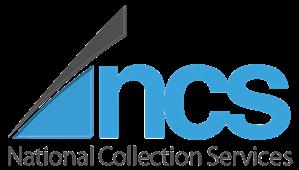
National Collection Services
Tel: 1300 888 758
Email: info@natcollection.com.au
Web: https://natcollection.com.au/
National Collection Services are a boutique Debt Collection Agency that sees ourselves as an ‘extension’ of your internal credit department. We will work with you to form a partnership, with our focus being placed on the associated levels of engagement, support, communication and goals of your organisation.

Tasmanian Collection Service
Tel: 03 6213 5555
Email: connect@tascol.com.au
Web: https://www.tascol.com.au/
With over 140 years’ experience, branches in Hobart, Launceston and Burnie and a database on the Tasmanian population that is second to none, there is no one better placed to handle your Tasmanian debts. Why not consider outsourcing to a local expert, you’ll be glad you did.
Credisense
Neill Borg, Enterprise Director
Tel: 0401 066 624
Email: neill.borg@credisense.io
Web: https://credisense.co.nz/
Credisense revolutionises the way businesses acquire new customers. One-size does not fit all. Our platform provides personalised, omnichannel, and unified customer experiences that embody your brand. Orchestrate and analyse thousands of data points and services that automate any process or decision. All from the cloud. All with no coding.
AICM Divisional Partner

Onguard
Tel: 1800 123 613
Web: www.onguard.com
OnGuard’s Credit management solution will help you hit your collection targets – each and every month.
By working smarter and providing better visibility, OnGuard will help you reduce your DSOs. Why not give your staff a friendly solution that will make their life so much easier.
Contact us to show you how OnGuard has made life a whole lot easier for our customers.
AICM Divisional Partner

Opypro
Email: partner@opypro.com.au
Web: www.opypro.com.au
Opypro is a single cloud-based platform that fully automates the end-to-end B2B credit management process. Multiple systems can be replaced by Opypro streamlining onboarding, providing real time access to business buyer account information and increasing payment success with consolidated invoicing, automated Dunning cycles and payment reconciliation. Contact us to see how Opypro can drive efficiencies across your trade accounts receivable process.

For information, options and pricing please contact Claire Kasses on +61 2 9174 5727 or E: claire@aicm.com.au
Lane Communications
Tel: 08 8179 9900
Web: www.laneprint.com.au
Lane are widely regarded as one of the largest and most technologically advanced print production and distribution companies in Australia. We are an industry leader in digital and offset print, point of sale signs, complex embellishments and print finishing, storage, kitting and mailing. With innovation at our core, our services extend beyond transactional mail and promotional print production to include SMS, bulk email communications, and electronic billing solutions. Lane are your partner in print and multi-channel communications.
Building
Tel: 07 3852 1342, 1800 931 222
Email: bicb@bicb.com.au
Web: https://bicb.com.au
If your business supplies the building industry, we have industry-specific data that will raise your credit management decision-making effectiveness and perhaps prevent/minimise loss. We know you like to do your job well. Let us help you do it even better. For more info, call today.

GPO Box 276
Sydney NSW 2001
Tel: 1300 501 312
Web: www.creditorwatch.com.au
CreditorWatch is a leading commercial credit reporting bureau used by over 50,000 businesses across Australia. CreditorWatch offers a variety of products including customer monitoring/alerts, credit reporting, an indepth trade program and online credit applications to assist with customer onboarding and decisioning. Contact us today for more information or to organise a FREE DEMO of any of products.

Insolvency Intelligence for Credit Managers
Tel: 1300 265 753
Email: intelligence@jirschsutherland.com.au
Web: www.jirschsutherland.com.au/ insolvencyintelligence/
Insolvency Intelligence: a specialist provider of insolvency and turnaround advice and services for credit managers. Backed by national firm Jirsch Sutherland, our friendly team is just a phone call or email away, providing members with practical, strategic advice about corporate and personal insolvency. Free initial consultation; networking opportunities; training and presentations; knowledge database access. Contact us now to find out how we could assist you.
Tel: 13 83 32
Web: www.equifax.com.au
Equifax is a global information solutions company, providing data and insights that help organisations and individuals make more informed decisions. As a leading provider of credit information and analysis in Australia and New Zealand, Equifax serves key markets in risk management, marketing services and HR solutions.
Drawing from trusted sources to compile and process data, Equifax helps its customers see things and make connections that others can’t.
We’re proud of the AICM and we want to let all credit professionals know those businesses that support the AICM. Thank you to these companies for their continued support and please consider them first when you’re looking for assistance in your business. We’ll also include these sponsors on our website so you can be sure to find them easily.
For more information contact: Claire Kasses
Direct: +61 2 9174 5727
Email: claire@aicm.com.au
Tel: 1300 560 996
Tel: 13 23 33
Web: www.experian.com.au
Renowned for our expertise in credit risk management, we pride ourselves in providing market leading products and services which securely store and analyse the unique data of millions of individuals and commercial entities. While we specialise in credit risk assessment and decisioning software solutions, we also provide a full suite of products that span the entire credit lifecycle. This includes lead generation and sales prospecting tools and receivables optimisation solutions.
SV Partners
Level 8, 68 St George’s Terrace, Perth WA 6000
GPO Box 2527, Perth WA 6001
Tel: 08 6277 0026
Fax: 07 3229 7285
Email: perth@svp.com.au
Web: https://svpartners.com.au/
SV Partners is a specialist accounting and advisory firm with 17 offices across Australia. Our expert accountants have the skills and experience to provide tailored insolvency, turnaround and advisory services. We partner with professionals and their clients, providing expert advice with a human touch.

Vincents
Level 34 Santos Place, 32 Turbot Street
Brisbane QLD 4000
Tel: 1300 VINCENTS, (07) 3228 4000
Web: www.vincents.com.au
Vincents is a solutions-focused professional services firm with over 35 years of experience. Its Restructuring & Recovery team consists of experts in all aspects of insolvency, restructuring, and recovery. They are dedicated to supporting you or your clients during critical decision-making moments, acting as financial counsellors, and offering advice and solutions for a wide range of financial distress situations. Regardless of the size or complexity of the matter, their team collaborates closely with you, your stakeholders, and advisors – including lawyers, accountants, financiers, and creditors – to achieve the best possible outcome.

For information, options and pricing please contact Claire Kasses on +61 2 9174 5727 or E: claire@aicm.com.au

Agility Law
Contact: Levi Smouha, Managing Partner
Tel: 0423 982 333
Email: levi.smouha@agilitylaw.com.au
Contact: Janel Pearce, Senior Paralegal
Tel: 07 3521 8519
Email: janel.pearce@agilitylaw.com.au
Web: www.agilitylaw.com.au
Agility Law Group, based in Brisbane, specialises in debt recovery, litigation, insolvency, commercial, and property law. We handle both high-volume and complex, high-value disputes across all state and federal courts. Our expertise includes insurance and finance recovery actions. We provide strategic, practical solutions tailored to our clients’ objectives nationwide.
Divisional Supporting Sponsor

Holman Webb Lawyers
Tel: 02 9390 8000
Email: andrew.tanna@holmanwebb.com.au
Web: www.holmanwebb.com.au/
Holman Webb is a commercial and insurance law firm with over 60 years’ experience and the scale to provide a top-tier level of legal services. We deliver unique insights and bring relevant, real world experience to you from our offices in Sydney, Melbourne, Brisbane and Adelaide.

Results Legal
Level 4, 183 North Quay
Brisbane QLD 4000
Tel: 1300 757 534
Web: www.resultslegal.com.au
Results Legal is a national firm with a focus on promoting and protecting the rights of trade creditors. Our clients are some of Australia’s largest trade credit companies who rely on our assistance for legal recovery, dispute resolution, preference claim defence and PPSA rights. Results Legal are the obvious first choice for companies seeking a national solution to resolve commercial disputes and pursue swift, successful and cost effective legal recovery action.
Nova Legal
Level 2, 50 Kings Park Road
West Perth 6005
Tel: 08 9466 3177
Web: www.novalegal.com.au
Nova Legal can assist with the recovery of problem debtors (large and small). Founding director Raffaele Di Renzo acts for creditors, debtors, directors, credit managers and insolvency practitioners in relation to solvency issues and dispute resolution.

Rothwell Lawyers
Tel: (03) 9329 3500
Email: admin@rothlaw.com.au
Web: www.rothlaw.com.au
At Rothwell Lawyers, we are a commercial team of solicitors and other legal support staff that are experts within our field. We pride ourselves on our ability to provide sound legal advice to individuals and businesses of all sizes, from sole directors and shareholder companies and large national corporations. Whether it is basic debt recovery, commercial law and litigation, insolvency advice to agreements and contracts, the team at Rothwell Lawyers can help you today.
Divisional Supporting Sponsor
Byron Thomas Recruitment
Tel: 02 8677 3020
Email: info@byronthomas.com.au
Web: www.byronthomas.com.au/
As Sydney’s leading Executive Accounting and Finance recruitment service, we offer access to our exclusive relationships, networks and database of over 80,000 Accounting and Finance Candidates. We are a privately-owned Australian company that have been operating for over 10 years. We work with a variety of public, private, family owned and private equity-backed companies.

Access Intell Pty Ltd
PO Box 1551, Kenmore, QLD 4069
Tel: 1300 831 331
Email: admin@accessintell.com
Web: https://www.accessintell.com/
Access Intell is a fast-growing fintech with a suite of B2B credit management solutions. Our platform transforms diverse data from global sources into instantly understandable insights. The customisable products create a streamlined process from online trade applications and PPSR through to ongoing risk monitoring. Fast implementation gets you onboard within 24 hours for standard setup. Backed by responsive service and flexible pricing, Access Intell is trusted by organisations across diverse industries. Visit our website to book a demo.
Turks
Tel: 02 8257 5700
Email: marketinggroup@turkslegal.com.au
Web: www.turkslegal.com.au
Turks is a specialist commercial law firm with 33 Partners and over 160 staff across our Sydney, Melbourne and Brisbane offices. We are proud to look after the interests of trade creditor suppliers and financial institutions in:
l Portfolio debt recovery using our marketleading, real-time client interface, ‘TurksFocus’
l Resolution of complex debt disputes
l PPSA recovery
l Defence of unfair preference claims
l Supply documentation and guarantees.
FIS Global
Tel: +61438049227
Email: baden.quinane@fisglobal.com
Web: https://www.fisglobal.com/
FIS is a financial technology company providing solutions to financial institutions, corporations, and developers. Our Automated Finance portfolio provides a comprehensive suite of receivables, payables and revenue optimization tools that modernize the office of the CFO, helping turn finance from a cost center into a growth partner. We create financial technology solutions that remove friction, create revenue opportunities, and give clients the confidence and capabilities to grow their business. FIS is a member of the Fortune 500® and the Standard & Poor’s 500® Index. To learn more, visit FISglobal.com. Follow FIS on LinkedIn, Facebook and X

For information, options and pricing please contact Claire Kasses on +61 2 9174 5727 or E: claire@aicm.com.au

Aon Australia
Tel: 02 9253 7000
Email: barbara.cestaro@aon.com
Web: www.aon.com.au/australia/default.jsp
Aon is the world’s leading credit insurance broker providing innovative solutions against nonpayment risks, improving working capital and helping businesses to grow. Our deep experience across industries, investment in IT and network of credit specialists in 55 countries, provides us with the scale and expertise to deliver powerful solutions which enable businesses to identify and mitigate credit risks, sustain growth strategies with new and existing clients and optimise working capital and improve liquidity.
Slattery Valuations is Australia’s leading asset valuation team, trusted for accurate and efficient valuations nationwide and internationally. Our expertise spans finance, accounting, insolvency, insurance, mining, government, aviation, and marine sectors. We deliver discreet, evidence-backed valuations tailored to your needs and carried out under international valuation standards. Divisional
National Credit Insurance Brokers
Tel: 1800 882 820 (freecall)
Email: info@nci.com.au
Web: www.nci.com.au
National Credit Insurance Brokers (NCI) has established itself as the premier trade credit insurance broker in Australia, New Zealand, Singapore and Malaysia. Trade credit insurance is a highly specialised area of insurance and with its 35 years of experience, NCI has developed an unmatched depth of expertise in arranging the right protection at the best price for your particular trading needs.
Slattery
Email: gtanner@slatteryauctions.com.au
Web: www.slatteryassetadvisory.com www.slatteryauctions.com

